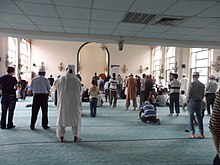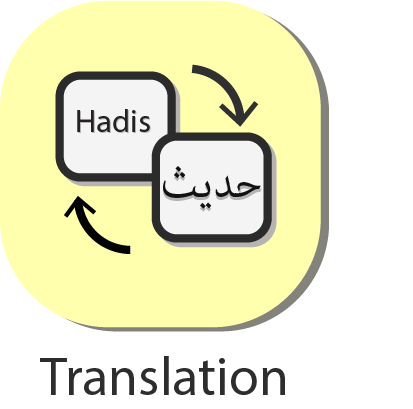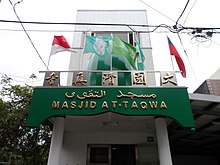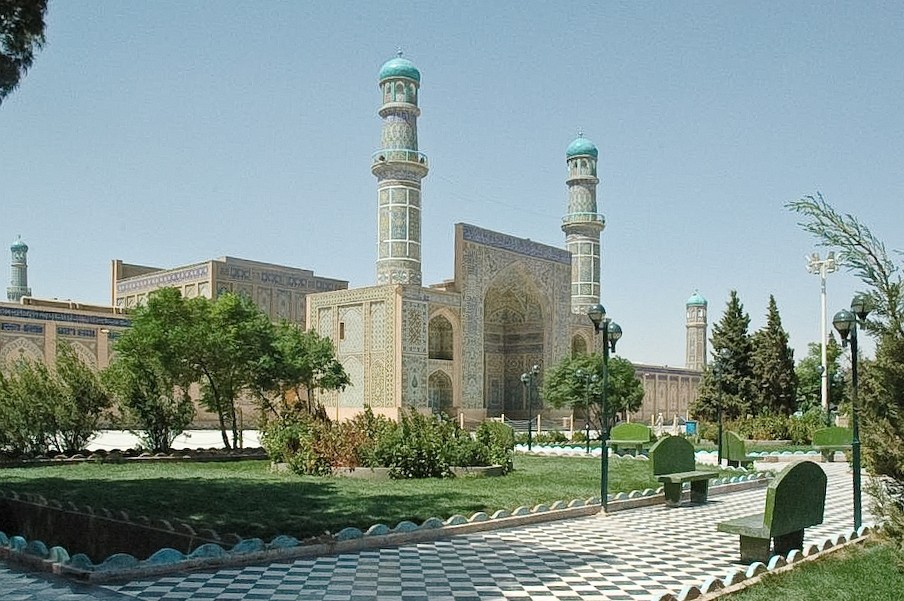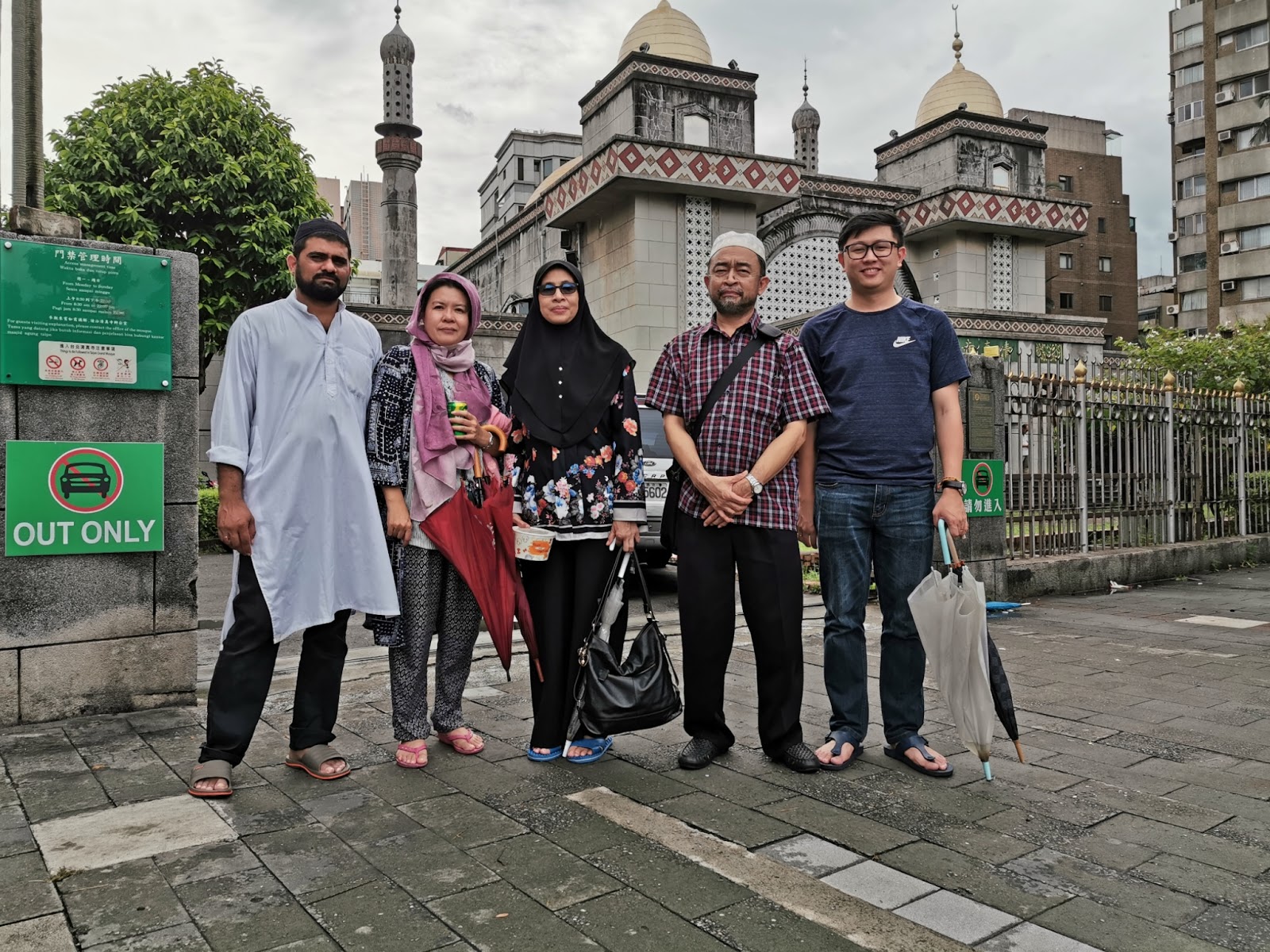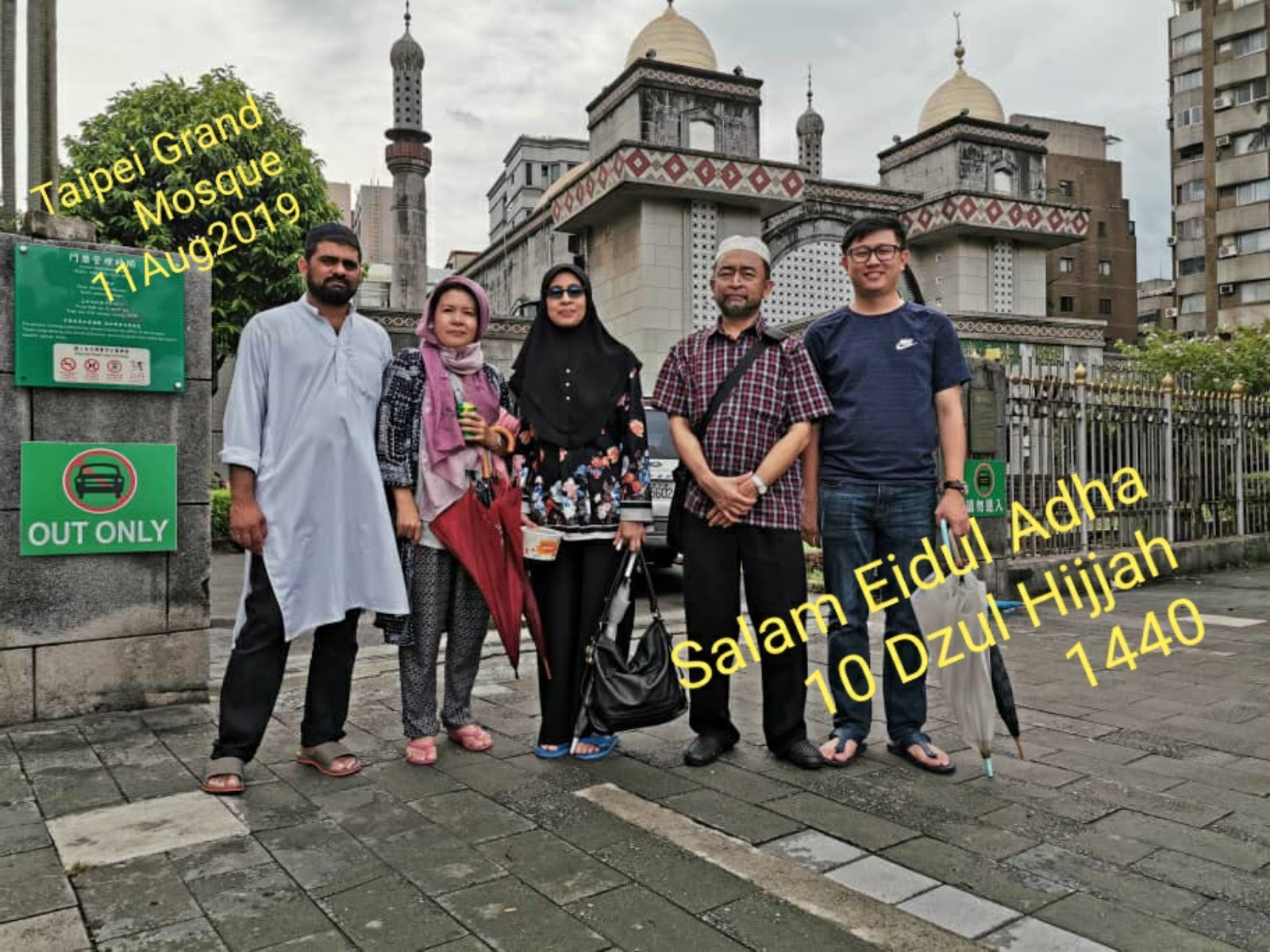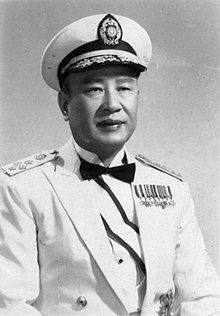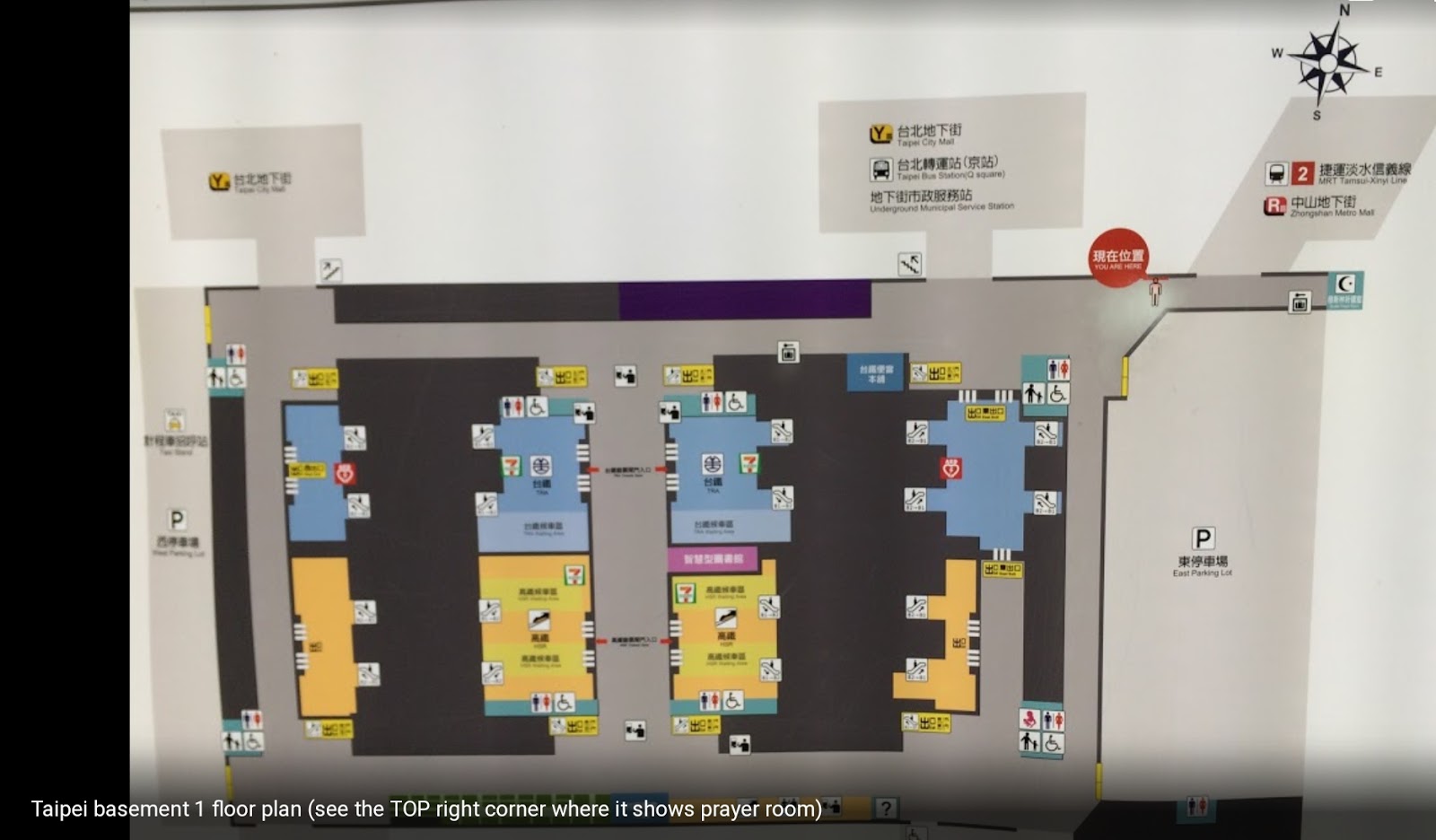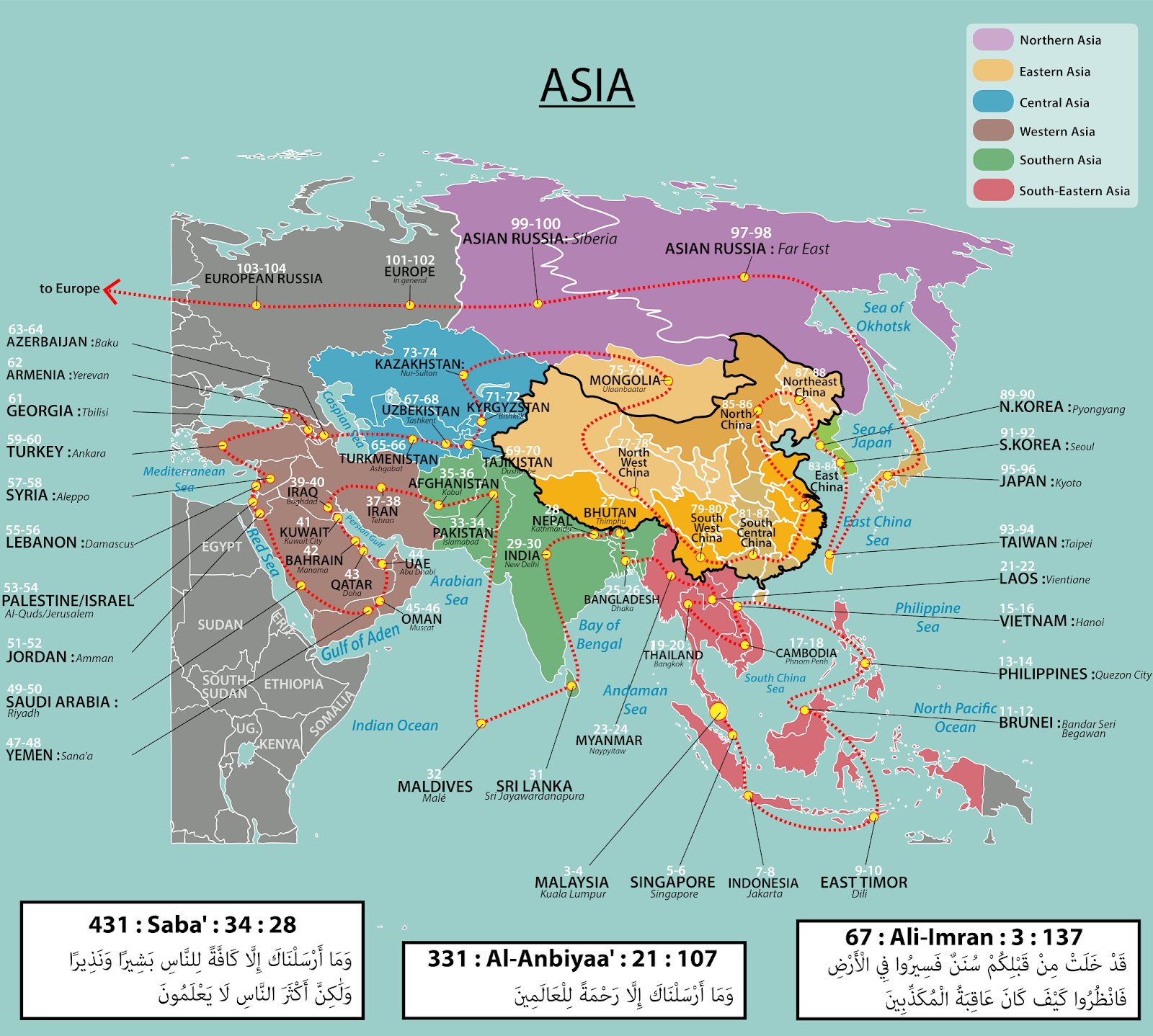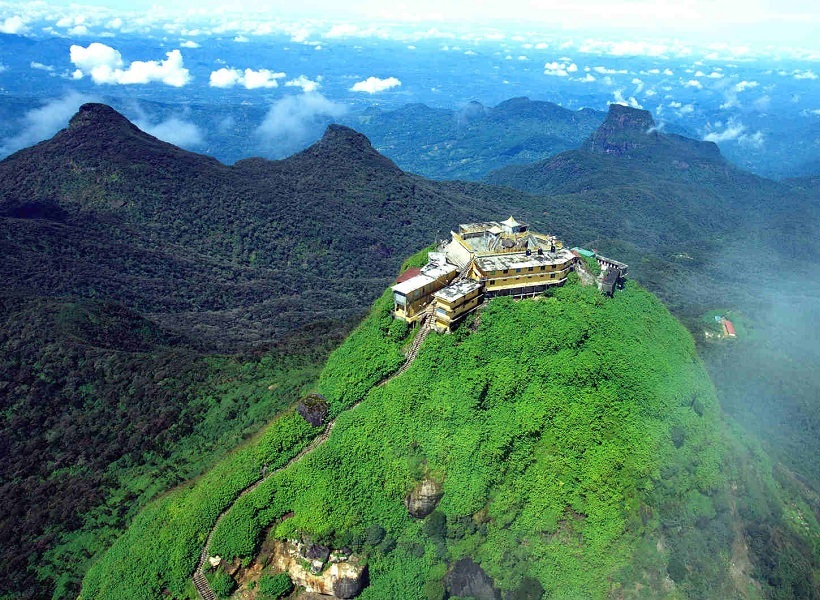322 - Al-Baqarah
ISLAM MISUNDERSTOOD...........more
Dakwah Knowledge
Geo - Mosque News & Stay ... more
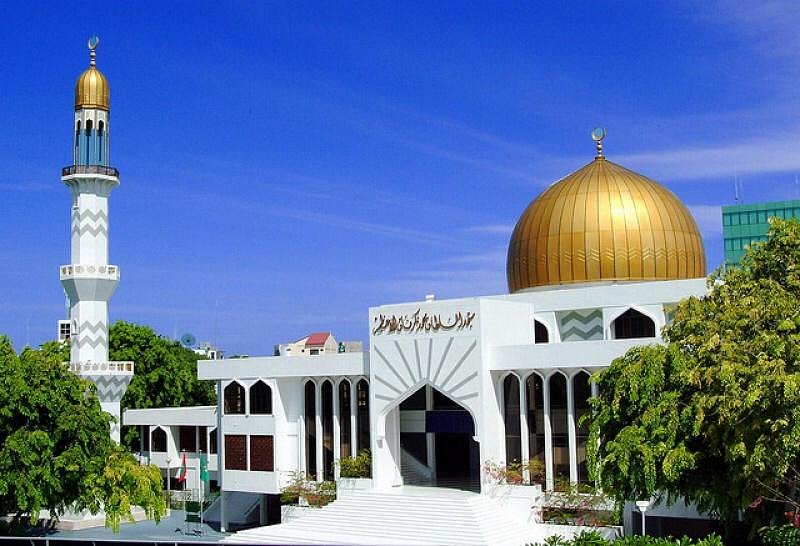
Grand Friday Mosque, Male
Hist - Mosque News & Stay

Remnant of historical site of the mosque and the tomb of Abu Dzar al Ghifari , al-Rabadha Saudi Arabia

Abu Dzar r.a. died in 32AD


Abbas bin Abdul Muttalib r.a. died in 32AD


The Kaohsiung Mosque (Chinese: 高雄清真寺; pinyin: Gāoxióng Qīngzhēnsì) is a mosque in Lingya District, Kaohsiung, Taiwan. It is the second mosque to be built in Taiwan after Taipei Grand Mosque in Taipei.
First building
Kaohsiung Mosque first building
Kaohsiung Mosque was built in 1949 in Taiwan by Muslim nationalists after their defeat against the communists in the Chinese civil war. In the beginning, Muslim public officers worked with the Kuomintanggovernment to suggest the construction of a new mosque in Taiwan and started to raise funds from January 1949. Initially, they rented a 270 square meters of space at 117 Wufu 4th (五福四) Road in Yancheng Districtas a temporary location.
Second building
Due to the limited space available at 117 Wufu 4th Road, they moved to a 460 square meters Japanese wooden style building at 196 Linsen 1st (林森一) Road in Xinxing District in 1951. The main prayer hall area was 135 square meter.[2]With the growing number of Muslim worshipers, they started to raise funds for the new mosque. In October 1988, the land of the old mosque were sold and the money they received was used to finance the construction of the new mosque. 196 Linsen 1st Road now houses FarEasTone customer care service center.
Current building
Kaohsiung Mosque prayer hall
In February 1990, they finally moved the mosque to the current bigger site and better equipped building to accommodate their growing numbers of Muslims located at 11 Jianjun (建軍) Road in Lingya District. Construction started on 17 December 1990, completed in late December 1991 and it was opened on April 1992.
Architecture
Friday prayer at Kaohsiung Mosque
Kaohsiung Mosque is a three-story building that features a large Middle Eastern vault. The design of the prayer hall, nooks, corners and components of the buildings are based on traditional mosques in the Middle East. The building covers an area of 2,657 square meters.
The first floor is the male and female dormitories, female prayer room and female activity center. The second floor is the main prayer hall, study center for Arabic language and Islamic culture display room. The third floor is the guest room, youth activity center, office and kitchen. The mosque also features the imam office, administration office, library and ablution area.
Beside the mosque there are some Halal restaurants owned by Muslim people.
Transportation
Kaohsiung Mosque is accessible within walking distance North from Weiwuying Station of the Kaohsiung MRT.
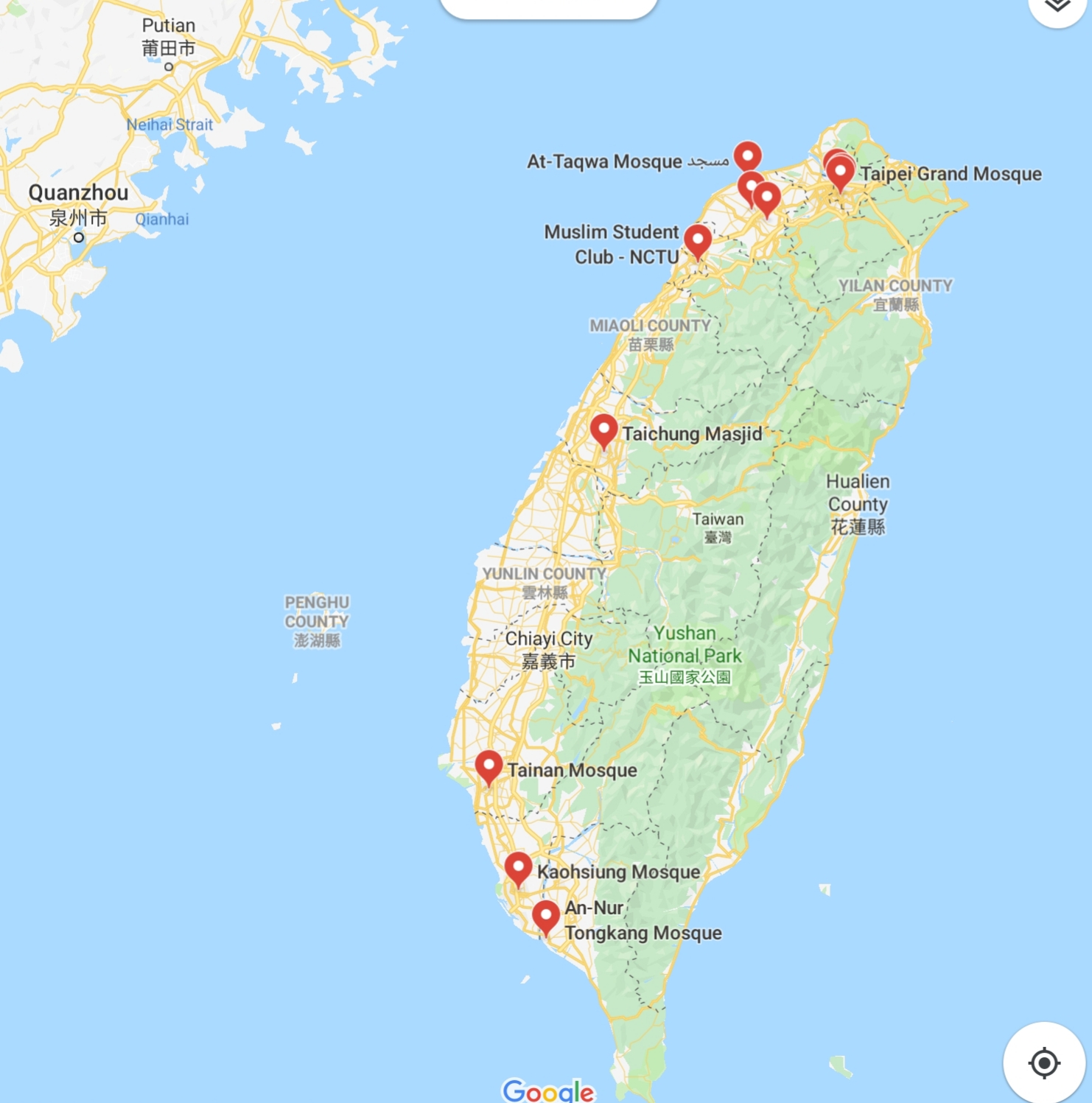

Mosques in Southern Taiwan

Tainan Mosque

Most Southern mosque in Taiwan
_______________________________________________
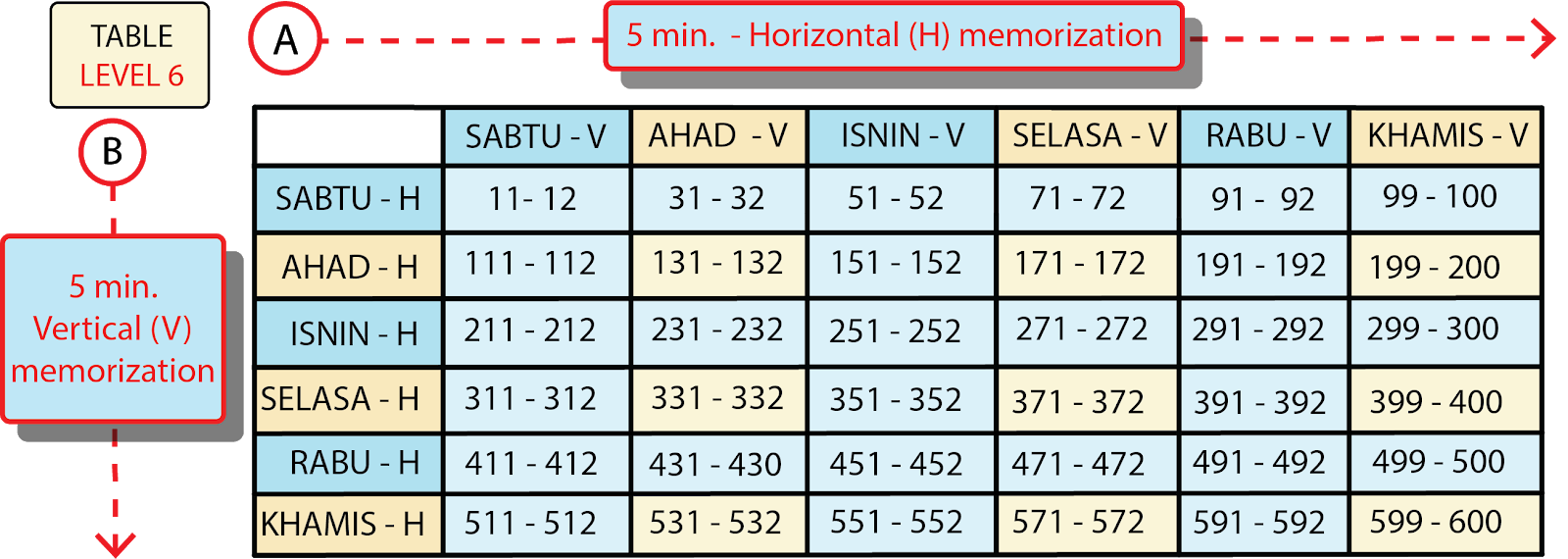
![]() V : 131-132
V : 131-132  User Guide
User Guide
H : 51-52
_______________________________________________
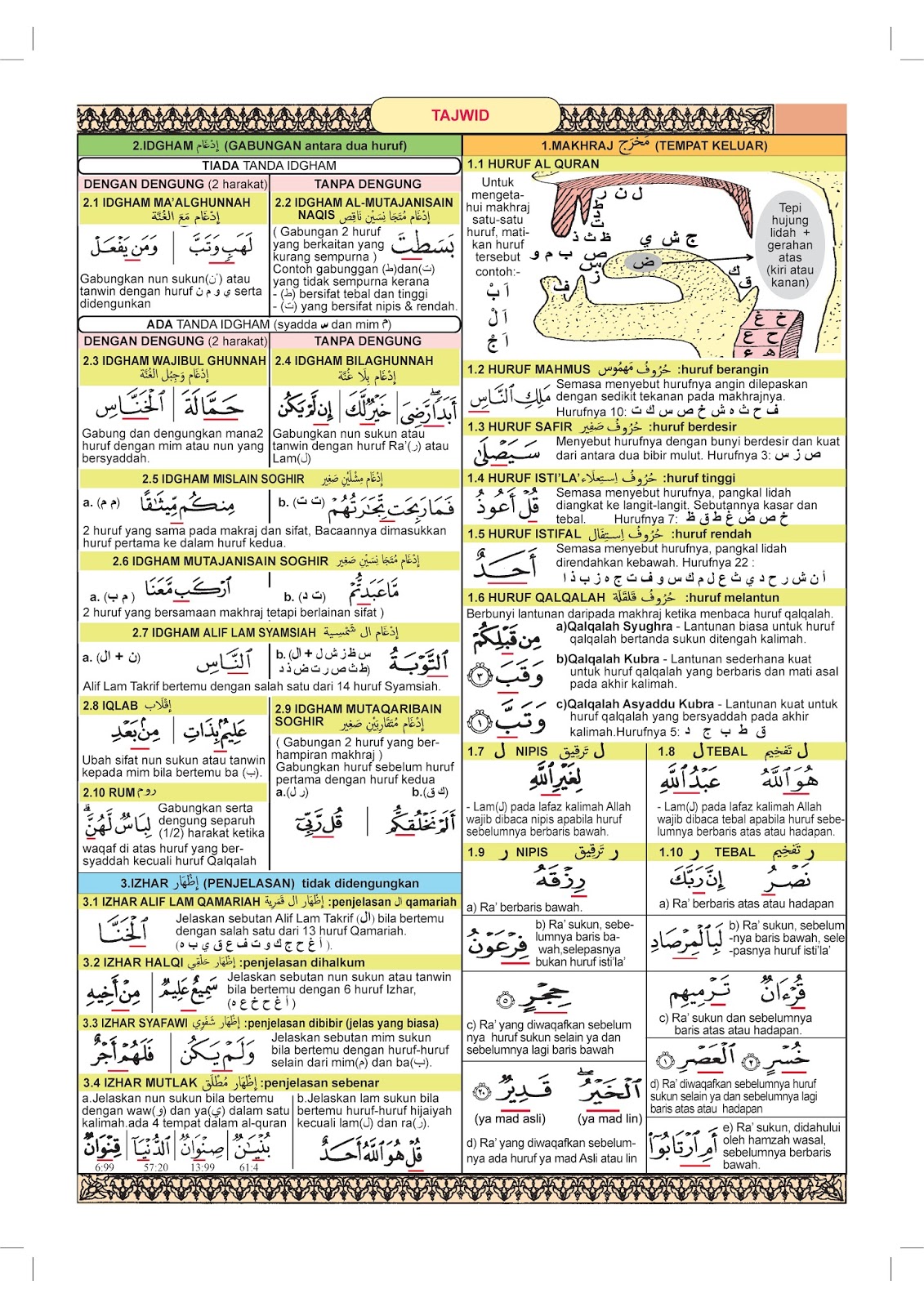

_______________________________________________
_______________________________________________
_______________________________________
Tafsir Muyassar تفسير المیسر
Saheeh International
Basmeih
Ma Jian
E......ARABIC : ENGLISH : MALAY : CHINESE
Tafsir Muyassar تفسير المیسر : Saheeh International : Basmeih : Ma Jian
_____________________________________________
Celik Tafsir
Tafsir Surah Baqarah Ayat 204 – 209 (Munafik)
_____________________________________________
Tafsir Muyassar : تفسير المیسر
٢٠٣ وَاذْكُرُوا اللَّهَ فِي أَيَّامٍ مَعْدُودَاتٍ ۚ فَمَنْ تَعَجَّلَ فِي يَوْمَيْنِ فَلَا إِثْمَ عَلَيْهِ وَمَنْ تَأَخَّرَ فَلَا إِثْمَ عَلَيْهِ ۚ لِمَنِ اتَّقَىٰ ۗ وَاتَّقُوا اللَّهَ وَاعْلَمُوا أَنَّكُمْ إِلَيْهِ تُحْشَرُونَ
٢٠٣ واذكروا الله تسبيحًا وتكبيرًا في أيام قلائل، وهي أيام التشريق: الحادي عشر والثاني عشر والثالث عشر من شهر ذي الحجة. فمن أراد التعجل وخرج من "مِنى" قبل غروب شمس اليوم الثاني عشر بعد رمي الجمار فلا ذنب عليه، ومن تأخر بأن بات بـ "مِنى" حتى يرمي الجمار في اليوم الثالث عشر فلا ذنب عليه، لمن اتقى الله في حجه. والتأخر أفضل؛ لأنه تزوُّد في العبادة واقتداء بفعل النبي صلى الله عليه وسلم. وخافوا الله- أيها المسلمون- وراقبوه في كل أعمالكم، واعلموا أنكم إليه وحده تُحْشَرون بعد موتكم للحساب والجزاء.
٢٠٤ وَمِنَ النَّاسِ مَنْ يُعْجِبُكَ قَوْلُهُ فِي الْحَيَاةِ الدُّنْيَا وَيُشْهِدُ اللَّهَ عَلَىٰ مَا فِي قَلْبِهِ وَهُوَ أَلَدُّ الْخِصَامِ
٢٠٤ وبعض الناس من المنافقين يعجبك -أيها الرسول- كلامه الفصيح الذي يريد به حظًّا من حظوظ الدنيا لا الآخرة، ويحلف مستشهدًا بالله على ما في قلبه من محبة الإسلام، وفي هذا غاية الجرأة على الله، وهو شديد العداوة والخصومة للإسلام والمسلمين.
٢٠٥ وَإِذَا تَوَلَّىٰ سَعَىٰ فِي الْأَرْضِ لِيُفْسِدَ فِيهَا وَيُهْلِكَ الْحَرْثَ وَالنَّسْلَ ۗ وَاللَّهُ لَا يُحِبُّ الْفَسَادَ
٢٠٥ وإذا خرج من عندك أيها الرسول، جَدَّ ونَشِط في الأرض ليفسد فيها، ويتلف زروع الناس، ويقتل ماشيتهم. والله لا يحب الفساد.
٢٠٦ وَإِذَا قِيلَ لَهُ اتَّقِ اللَّهَ أَخَذَتْهُ الْعِزَّةُ بِالْإِثْمِ ۚ فَحَسْبُهُ جَهَنَّمُ ۚ وَلَبِئْسَ الْمِهَادُ
٢٠٦ وإذا نُصِح ذلك المنافق المفسد، وقيل له: اتق الله واحذر عقابه، وكُفَّ عن الفساد في الأرض، لم يقبل النصيحة، بل يحمله الكبر وحميَّة الجاهلية على مزيد من الآثام، فَحَسْبُه جهنم وكافيته عذابًا، ولبئس الفراش هي.
٢٠٧ وَمِنَ النَّاسِ مَنْ يَشْرِي نَفْسَهُ ابْتِغَاءَ مَرْضَاتِ اللَّهِ ۗ وَاللَّهُ رَءُوفٌ بِالْعِبَادِ
٢٠٧ وبعض الناس يبيع نفسه طلبًا لرضا الله عنه، بالجهاد في سبيله، والتزام طاعته. والله رءوف بالعباد، يرحم عباده المؤمنين رحمة واسعة في عاجلهم وآجلهم، فيجازبهم أحسن الجزاء.
٢٠٨ يَا أَيُّهَا الَّذِينَ آمَنُوا ادْخُلُوا فِي السِّلْمِ كَافَّةً وَلَا تَتَّبِعُوا خُطُوَاتِ الشَّيْطَانِ ۚ إِنَّهُ لَكُمْ عَدُوٌّ مُبِينٌ
٢٠٨ يا أيها الذين آمنوا بالله ربًا وبمحمد نبيًا ورسولا وبالإسلام دينًا، ادخلوا في جميع شرائع الإسلام، عاملين بجميع أحكامه، ولا تتركوا منها شيئًا، ولا تتبعوا طرق الشيطان فيما يدعوكم إليه من المعاصي. إنه لكم عدو ظاهر العداوة فاحذروه.
٢٠٩ فَإِنْ زَلَلْتُمْ مِنْ بَعْدِ مَا جَاءَتْكُمُ الْبَيِّنَاتُ فَاعْلَمُوا أَنَّ اللَّهَ عَزِيزٌ حَكِيمٌ
٢٠٩ فإن انحرفتم عن طريق الحق، من بعد ما جاءتكم الحجج الواضحة من القرآن والسنة، فاعلموا أن الله عزيز في ملكه لا يفوته شيء، حكيم في أمره ونهيه، يضع كل شيء في موضعه المناسب له.
٢١٠ هَلْ يَنْظُرُونَ إِلَّا أَنْ يَأْتِيَهُمُ اللَّهُ فِي ظُلَلٍ مِنَ الْغَمَامِ وَالْمَلَائِكَةُ وَقُضِيَ الْأَمْرُ ۚ وَإِلَى اللَّهِ تُرْجَعُ الْأُمُورُ
٢١٠ ما ينتظر هؤلاء المعاندون الكافرون بعد قيام الأدلة البينة إلا أن يأتيهم الله عز وجل على الوجه اللائق به سبحانه في ظُلَل من السحاب يوم القيامة؛ ليفصل بينهم بالقضاء العادل، وأن تأتي الملائكة، وحينئذ يقضي الله تعالى فيهم قضاءه. وإليه وحده ترجع أمور الخلائق جميعها.
_____________________________________________
____________________________________________
Saheeh International
٢٠٣ وَاذْكُرُوا اللَّهَ فِي أَيَّامٍ مَعْدُودَاتٍ ۚ فَمَنْ تَعَجَّلَ فِي يَوْمَيْنِ فَلَا إِثْمَ عَلَيْهِ وَمَنْ تَأَخَّرَ فَلَا إِثْمَ عَلَيْهِ ۚ لِمَنِ اتَّقَىٰ ۗ وَاتَّقُوا اللَّهَ وَاعْلَمُوا أَنَّكُمْ إِلَيْهِ تُحْشَرُونَ
203 And remember Allah during [specific] numbered days. Then whoever hastens [his departure] in two days - there is no sin upon him; and whoever delays [until the third] - there is no sin upon him - for him who fears Allah. And fear Allah and know that unto Him you will be gathered.
٢٠٤ وَمِنَ النَّاسِ مَنْ يُعْجِبُكَ قَوْلُهُ فِي الْحَيَاةِ الدُّنْيَا وَيُشْهِدُ اللَّهَ عَلَىٰ مَا فِي قَلْبِهِ وَهُوَ أَلَدُّ الْخِصَامِ
204 And of the people is he whose speech pleases you in worldly life, and he calls Allah to witness as to what is in his heart, yet he is the fiercest of opponents.
٢٠٥ وَإِذَا تَوَلَّىٰ سَعَىٰ فِي الْأَرْضِ لِيُفْسِدَ فِيهَا وَيُهْلِكَ الْحَرْثَ وَالنَّسْلَ ۗ وَاللَّهُ لَا يُحِبُّ الْفَسَادَ
205 And when he goes away, he strives throughout the land to cause corruption therein and destroy crops and animals. And Allah does not like corruption.
٢٠٦ وَإِذَا قِيلَ لَهُ اتَّقِ اللَّهَ أَخَذَتْهُ الْعِزَّةُ بِالْإِثْمِ ۚ فَحَسْبُهُ جَهَنَّمُ ۚ وَلَبِئْسَ الْمِهَادُ
206 And when it is said to him, "Fear Allah," pride in the sin takes hold of him. Sufficient for him is Hellfire, and how wretched is the resting place.
٢٠٧ وَمِنَ النَّاسِ مَنْ يَشْرِي نَفْسَهُ ابْتِغَاءَ مَرْضَاتِ اللَّهِ ۗ وَاللَّهُ رَءُوفٌ بِالْعِبَادِ
207 And of the people is he who sells himself, seeking means to the approval of Allah. And Allah is kind to [His] servants.
٢٠٨ يَا أَيُّهَا الَّذِينَ آمَنُوا ادْخُلُوا فِي السِّلْمِ كَافَّةً وَلَا تَتَّبِعُوا خُطُوَاتِ الشَّيْطَانِ ۚ إِنَّهُ لَكُمْ عَدُوٌّ مُبِينٌ
208 O you who have believed, enter into Islam completely [and perfectly] and do not follow the footsteps of Satan. Indeed, he is to you a clear enemy.
٢٠٩ فَإِنْ زَلَلْتُمْ مِنْ بَعْدِ مَا جَاءَتْكُمُ الْبَيِّنَاتُ فَاعْلَمُوا أَنَّ اللَّهَ عَزِيزٌ حَكِيمٌ
209 But if you deviate after clear proofs have come to you, then know that Allah is Exalted in Might and Wise.
٢١٠ هَلْ يَنْظُرُونَ إِلَّا أَنْ يَأْتِيَهُمُ اللَّهُ فِي ظُلَلٍ مِنَ الْغَمَامِ وَالْمَلَائِكَةُ وَقُضِيَ الْأَمْرُ ۚ وَإِلَى اللَّهِ تُرْجَعُ الْأُمُورُ
210 Do they await but that Allah should come to them in covers of clouds and the angels [as well] and the matter is [then] decided? And to Allah [all] matters are returned.
___________________________________________
___________________________________________
Basmeih
٢٠٣ وَاذْكُرُوا اللَّهَ فِي أَيَّامٍ مَعْدُودَاتٍ ۚ فَمَنْ تَعَجَّلَ فِي يَوْمَيْنِ فَلَا إِثْمَ عَلَيْهِ وَمَنْ تَأَخَّرَ فَلَا إِثْمَ عَلَيْهِ ۚ لِمَنِ اتَّقَىٰ ۗ وَاتَّقُوا اللَّهَ وَاعْلَمُوا أَنَّكُمْ إِلَيْهِ تُحْشَرُونَ
203 Dan sebutlah kamu akan Allah (dengan takbir semasa mengerjakan Haji) dalam beberapa hari yang tertentu bilangannya. Kemudian sesiapa yang segera (meninggalkan Mina) pada hari yang kedua, maka ia tidaklah berdosa dan sesiapa yang melambatkan (meninggalkan Mina) maka ia juga tidaklah berdosa; (ketiadaan dosa itu ialah) bagi orang yang bertaqwa dan hendaklah kamu bertaqwa kepada Allah dan ketahuilah sesungguhnya kamu akan dihimpunkan kepadanya.
٢٠٤ وَمِنَ النَّاسِ مَنْ يُعْجِبُكَ قَوْلُهُ فِي الْحَيَاةِ الدُّنْيَا وَيُشْهِدُ اللَّهَ عَلَىٰ مَا فِي قَلْبِهِ وَهُوَ أَلَدُّ الْخِصَامِ
204 Dan di antara manusia ada orang yang tutur katanya mengenai hal kehidupan dunia, menyebabkan engkau tertarik hati (mendengarnya), dan ia (bersumpah dengan mengatakan bahawa) Allah menjadi saksi atas apa yang ada dalam hatinya, padahal ia adalah orang yang amat keras permusuhannya (kepadamu).
٢٠٥ وَإِذَا تَوَلَّىٰ سَعَىٰ فِي الْأَرْضِ لِيُفْسِدَ فِيهَا وَيُهْلِكَ الْحَرْثَ وَالنَّسْلَ ۗ وَاللَّهُ لَا يُحِبُّ الْفَسَادَ
205 Kemudian apabila ia pergi (dengan mendapat hajatnya), berusahalah ia di bumi, untuk melakukan bencana padanya, dan membinasakan tanaman-tanaman dan keturunan (binatang ternak dan manusia; sedang Allah tidak suka kepada bencana kerosakan.
٢٠٦ وَإِذَا قِيلَ لَهُ اتَّقِ اللَّهَ أَخَذَتْهُ الْعِزَّةُ بِالْإِثْمِ ۚ فَحَسْبُهُ جَهَنَّمُ ۚ وَلَبِئْسَ الْمِهَادُ
206 Dan apabila dikatakan kepadanya: "Bertaqwalah engkau kepada Allah" timbulah kesombongannya dengan (meneruskan) dosa (yang dilakukannya itu). Oleh itu padanlah ia (menerima balasan azab) neraka jahannam dan demi sesungguhnya, (neraka jahannam itu) adalah seburuk-buruk tempat tinggal.
٢٠٧ وَمِنَ النَّاسِ مَنْ يَشْرِي نَفْسَهُ ابْتِغَاءَ مَرْضَاتِ اللَّهِ ۗ وَاللَّهُ رَءُوفٌ بِالْعِبَادِ
207 Dan di antara manusia ada yang mengorbankan dirinya kerana mencari keredaan Allah semata-mata; dan Allah pula Amat belas-kasihan akan hamba-hambanya.
٢٠٨ يَا أَيُّهَا الَّذِينَ آمَنُوا ادْخُلُوا فِي السِّلْمِ كَافَّةً وَلَا تَتَّبِعُوا خُطُوَاتِ الشَّيْطَانِ ۚ إِنَّهُ لَكُمْ عَدُوٌّ مُبِينٌ
208 Wahai orang-orang yang beriman! Masuklah kamu ke dalam Ugama Islam (dengan mematuhi) segala hukum-hukumnya; dan janganlah kamu menurut jejak langkah Syaitan; sesungguhnya Syaitan itu musuh bagi kamu yang terang nyata.
٢٠٩ فَإِنْ زَلَلْتُمْ مِنْ بَعْدِ مَا جَاءَتْكُمُ الْبَيِّنَاتُ فَاعْلَمُوا أَنَّ اللَّهَ عَزِيزٌ حَكِيمٌ
209 Maka kalau kamu tergelincir (dan jatuh ke dalam kesalahan disebabkan tipu daya Syaitan itu), sesudah datang keterangan-keterangan yang jelas kepada kamu, maka ketahuilah bahawasanya Allah Maha Kuasa, lagi Maha Bijaksana.
٢١٠ هَلْ يَنْظُرُونَ إِلَّا أَنْ يَأْتِيَهُمُ اللَّهُ فِي ظُلَلٍ مِنَ الْغَمَامِ وَالْمَلَائِكَةُ وَقُضِيَ الْأَمْرُ ۚ وَإِلَى اللَّهِ تُرْجَعُ الْأُمُورُ
210 (Orang-orang yang ingkar itu) tidak menunggu melainkan kedatangan (azab) Allah kepada mereka dalam lindungan-lindungan awan, bersama-sama dengan malaikat (yang menjalankannya), padahal telahpun diputuskan perkara itu (balasan azab yang menimpa mereka); dan kepada Allah jua kembalinya segala urusan.
______________________________________________
____________________________________________
Ma Jian
٢٠٣ وَاذْكُرُوا اللَّهَ فِي أَيَّامٍ مَعْدُودَاتٍ ۚ فَمَنْ تَعَجَّلَ فِي يَوْمَيْنِ فَلَا إِثْمَ عَلَيْهِ وَمَنْ تَأَخَّرَ فَلَا إِثْمَ عَلَيْهِ ۚ لِمَنِ اتَّقَىٰ ۗ وَاتَّقُوا اللَّهَ وَاعْلَمُوا أَنَّكُمْ إِلَيْهِ تُحْشَرُونَ
203 你们当在数日内记念真主,在两日内仓猝起程的人,毫无罪过;延迟的人,也无罪过。(抉择的权利),专归敬畏的人。你们当敬畏真主,当知道你们只被集合在他那里。
٢٠٤ وَمِنَ النَّاسِ مَنْ يُعْجِبُكَ قَوْلُهُ فِي الْحَيَاةِ الدُّنْيَا وَيُشْهِدُ اللَّهَ عَلَىٰ مَا فِي قَلْبِهِ وَهُوَ أَلَدُّ الْخِصَامِ
204 有人谈论今世的生活,他的言论,使你赞叹,他还求真主作证他的存心。其实,他是最强悍的仇敌。
٢٠٥ وَإِذَا تَوَلَّىٰ سَعَىٰ فِي الْأَرْضِ لِيُفْسِدَ فِيهَا وَيُهْلِكَ الْحَرْثَ وَالنَّسْلَ ۗ وَاللَّهُ لَا يُحِبُّ الْفَسَادَ
205 他转脸之後,图谋不轨,蹂躏禾稼,伤害牲畜。真主是不喜作恶的。
٢٠٦ وَإِذَا قِيلَ لَهُ اتَّقِ اللَّهَ أَخَذَتْهُ الْعِزَّةُ بِالْإِثْمِ ۚ فَحَسْبُهُ جَهَنَّمُ ۚ وَلَبِئْسَ الْمِهَادُ
206 有人对他说:你当敬畏真主,他就因羞愤而犯罪。火狱将使他满足,那卧褥真恶劣。
٢٠٧ وَمِنَ النَّاسِ مَنْ يَشْرِي نَفْسَهُ ابْتِغَاءَ مَرْضَاتِ اللَّهِ ۗ وَاللَّهُ رَءُوفٌ بِالْعِبَادِ
207 有人为求真主的喜悦而自愿捐躯。真主是仁爱众仆的。
٢٠٨ يَا أَيُّهَا الَّذِينَ آمَنُوا ادْخُلُوا فِي السِّلْمِ كَافَّةً وَلَا تَتَّبِعُوا خُطُوَاتِ الشَّيْطَانِ ۚ إِنَّهُ لَكُمْ عَدُوٌّ مُبِينٌ
208 信道的人们啊!你们当全体入在和平教中,不要跟随恶魔的步伐,他确是你们的明敌。
٢٠٩ فَإِنْ زَلَلْتُمْ مِنْ بَعْدِ مَا جَاءَتْكُمُ الْبَيِّنَاتُ فَاعْلَمُوا أَنَّ اللَّهَ عَزِيزٌ حَكِيمٌ
209 如果你们在明证降临之後背离正道,那末,你们当知道真主是万能的,是至睿的。
٢١٠ هَلْ يَنْظُرُونَ إِلَّا أَنْ يَأْتِيَهُمُ اللَّهُ فِي ظُلَلٍ مِنَ الْغَمَامِ وَالْمَلَائِكَةُ وَقُضِيَ الْأَمْرُ ۚ وَإِلَى اللَّهِ تُرْجَعُ الْأُمُورُ
210 他们只等待真主在云荫中与众天神同齐降临,事情将被判决。一切事情,只归真主安排。
_____________________________________________
_______________________________________________
E......ARABIC : ENGLISH : MALAY : CHINESE
Tafsir Muyassar تفسير المیسر : Saheeh International : Basmeih : Ma Jian
٢٠٣ وَاذْكُرُوا اللَّهَ فِي أَيَّامٍ مَعْدُودَاتٍ ۚ فَمَنْ تَعَجَّلَ فِي يَوْمَيْنِ فَلَا إِثْمَ عَلَيْهِ وَمَنْ تَأَخَّرَ فَلَا إِثْمَ عَلَيْهِ ۚ لِمَنِ اتَّقَىٰ ۗ وَاتَّقُوا اللَّهَ وَاعْلَمُوا أَنَّكُمْ إِلَيْهِ تُحْشَرُونَ
٢٠٣ واذكروا الله تسبيحًا وتكبيرًا في أيام قلائل، وهي أيام التشريق: الحادي عشر والثاني عشر والثالث عشر من شهر ذي الحجة. فمن أراد التعجل وخرج من "مِنى" قبل غروب شمس اليوم الثاني عشر بعد رمي الجمار فلا ذنب عليه، ومن تأخر بأن بات بـ "مِنى" حتى يرمي الجمار في اليوم الثالث عشر فلا ذنب عليه، لمن اتقى الله في حجه. والتأخر أفضل؛ لأنه تزوُّد في العبادة واقتداء بفعل النبي صلى الله عليه وسلم. وخافوا الله- أيها المسلمون- وراقبوه في كل أعمالكم، واعلموا أنكم إليه وحده تُحْشَرون بعد موتكم للحساب والجزاء.
203 And remember Allah during [specific] numbered days. Then whoever hastens [his departure] in two days - there is no sin upon him; and whoever delays [until the third] - there is no sin upon him - for him who fears Allah. And fear Allah and know that unto Him you will be gathered.
203 你们当在数日内记念真主,在两日内仓猝起程的人,毫无罪过;延迟的人,也无罪过。(抉择的权利),专归敬畏的人。你们当敬畏真主,当知道你们只被集合在他那里。
٢٠٤ وَمِنَ النَّاسِ مَنْ يُعْجِبُكَ قَوْلُهُ فِي الْحَيَاةِ الدُّنْيَا وَيُشْهِدُ اللَّهَ عَلَىٰ مَا فِي قَلْبِهِ وَهُوَ أَلَدُّ الْخِصَامِ
٢٠٤ وبعض الناس من المنافقين يعجبك -أيها الرسول- كلامه الفصيح الذي يريد به حظًّا من حظوظ الدنيا لا الآخرة، ويحلف مستشهدًا بالله على ما في قلبه من محبة الإسلام، وفي هذا غاية الجرأة على الله، وهو شديد العداوة والخصومة للإسلام والمسلمين.
204 And of the people is he whose speech pleases you in worldly life, and he calls Allah to witness as to what is in his heart, yet he is the fiercest of opponents.
204 有人谈论今世的生活,他的言论,使你赞叹,他还求真主作证他的存心。其实,他是最强悍的仇敌。
٢٠٥ وَإِذَا تَوَلَّىٰ سَعَىٰ فِي الْأَرْضِ لِيُفْسِدَ فِيهَا وَيُهْلِكَ الْحَرْثَ وَالنَّسْلَ ۗ وَاللَّهُ لَا يُحِبُّ الْفَسَادَ
٢٠٥ وإذا خرج من عندك أيها الرسول، جَدَّ ونَشِط في الأرض ليفسد فيها، ويتلف زروع الناس، ويقتل ماشيتهم. والله لا يحب الفساد.
205 And when he goes away, he strives throughout the land to cause corruption therein and destroy crops and animals. And Allah does not like corruption.
205 他转脸之後,图谋不轨,蹂躏禾稼,伤害牲畜。真主是不喜作恶的。
٢٠٦ وَإِذَا قِيلَ لَهُ اتَّقِ اللَّهَ أَخَذَتْهُ الْعِزَّةُ بِالْإِثْمِ ۚ فَحَسْبُهُ جَهَنَّمُ ۚ وَلَبِئْسَ الْمِهَادُ
٢٠٦ وإذا نُصِح ذلك المنافق المفسد، وقيل له: اتق الله واحذر عقابه، وكُفَّ عن الفساد في الأرض، لم يقبل النصيحة، بل يحمله الكبر وحميَّة الجاهلية على مزيد من الآثام، فَحَسْبُه جهنم وكافيته عذابًا، ولبئس الفراش هي.
206 And when it is said to him, "Fear Allah," pride in the sin takes hold of him. Sufficient for him is Hellfire, and how wretched is the resting place.
206 有人对他说:你当敬畏真主,他就因羞愤而犯罪。火狱将使他满足,那卧褥真恶劣。
٢٠٧ وَمِنَ النَّاسِ مَنْ يَشْرِي نَفْسَهُ ابْتِغَاءَ مَرْضَاتِ اللَّهِ ۗ وَاللَّهُ رَءُوفٌ بِالْعِبَادِ
٢٠٧ وبعض الناس يبيع نفسه طلبًا لرضا الله عنه، بالجهاد في سبيله، والتزام طاعته. والله رءوف بالعباد، يرحم عباده المؤمنين رحمة واسعة في عاجلهم وآجلهم، فيجازبهم أحسن الجزاء.
207 And of the people is he who sells himself, seeking means to the approval of Allah. And Allah is kind to [His] servants.
207 有人为求真主的喜悦而自愿捐躯。真主是仁爱众仆的。
٢٠٨ يَا أَيُّهَا الَّذِينَ آمَنُوا ادْخُلُوا فِي السِّلْمِ كَافَّةً وَلَا تَتَّبِعُوا خُطُوَاتِ الشَّيْطَانِ ۚ إِنَّهُ لَكُمْ عَدُوٌّ مُبِينٌ
٢٠٨ يا أيها الذين آمنوا بالله ربًا وبمحمد نبيًا ورسولا وبالإسلام دينًا، ادخلوا في جميع شرائع الإسلام، عاملين بجميع أحكامه، ولا تتركوا منها شيئًا، ولا تتبعوا طرق الشيطان فيما يدعوكم إليه من المعاصي. إنه لكم عدو ظاهر العداوة فاحذروه.
208 O you who have believed, enter into Islam completely [and perfectly] and do not follow the footsteps of Satan. Indeed, he is to you a clear enemy.
208 信道的人们啊!你们当全体入在和平教中,不要跟随恶魔的步伐,他确是你们的明敌。
٢٠٩ فَإِنْ زَلَلْتُمْ مِنْ بَعْدِ مَا جَاءَتْكُمُ الْبَيِّنَاتُ فَاعْلَمُوا أَنَّ اللَّهَ عَزِيزٌ حَكِيمٌ
٢٠٩ فإن انحرفتم عن طريق الحق، من بعد ما جاءتكم الحجج الواضحة من القرآن والسنة، فاعلموا أن الله عزيز في ملكه لا يفوته شيء، حكيم في أمره ونهيه، يضع كل شيء في موضعه المناسب له.
209 But if you deviate after clear proofs have come to you, then know that Allah is Exalted in Might and Wise.
209 如果你们在明证降临之後背离正道,那末,你们当知道真主是万能的,是至睿的。
٢١٠ هَلْ يَنْظُرُونَ إِلَّا أَنْ يَأْتِيَهُمُ اللَّهُ فِي ظُلَلٍ مِنَ الْغَمَامِ وَالْمَلَائِكَةُ وَقُضِيَ الْأَمْرُ ۚ وَإِلَى اللَّهِ تُرْجَعُ الْأُمُورُ
٢١٠ ما ينتظر هؤلاء المعاندون الكافرون بعد قيام الأدلة البينة إلا أن يأتيهم الله عز وجل على الوجه اللائق به سبحانه في ظُلَل من السحاب يوم القيامة؛ ليفصل بينهم بالقضاء العادل، وأن تأتي الملائكة، وحينئذ يقضي الله تعالى فيهم قضاءه. وإليه وحده ترجع أمور الخلائق جميعها.
210 Do they await but that Allah should come to them in covers of clouds and the angels [as well] and the matter is [then] decided? And to Allah [all] matters are returned.
210 他们只等待真主在云荫中与众天神同齐降临,事情将被判决。一切事情,只归真主安排。
______________________________________________
______________________________________________
3. LEARN ARABIC : OTHER LANGUAGES






|
فعل
مجهول
مضارع |
فعل
مجهول
ماض |
فعل
معلوم
مضارع |
فعل
معلوم
ماض |
|
|
يُفْعَلُ |
فُعِلَ |
يَفْعَلُ |
فَعَلَ |
I |
|
يُفَعَّلُ |
فُعِّلَ |
يَفَعِّلُ |
فَعَّلَ |
II |
|
يُفَاعَلُ |
فُوْعِلَ |
يُفَاعِلُ |
فَاعَلَ |
III |
|
يُفْعَلُ |
أُفْعِلَ |
يُفْعِلُ |
أَفْعَلَ |
IV |
|
يُتَفَعَّلُ |
تُفُعِّلَ |
يَتَفَعَّلُ |
تَفَعَّلَ |
V |
|
يُتَفَاعَلُ |
تُفُوعِلَ |
يَتَفَاعَلُ |
تَفَاعَلَ |
VI |
|
يُنْفَعَلُ |
أُنْفُعِلَ |
يَنْفَعِلُ |
إِنْفَعَلَ |
VII |
|
يُفْتَعَلُ |
أُفْتُعِلَ |
يُفْتَعِلُ |
إِفْتَعَلَ |
VIII |
|
يُفَعَّلُ |
أُفْعِلَّ |
يَفْعَلُّ |
إِفْعَلَّ |
IX |
|
يُسْتَفْعَلُ |
أُسْتُفْعِلَ |
يَسْتَفْعِلُ |
إِسْتَفْعَلَ |
X |
|
مصدر |
فعل
النهي |
فعل
الأمر |
|
|
فَعْلٌ |
لاَتَفْعَلْ |
إِِفْعَلْ |
I |
|
تَفْعِيْلٌ |
لاَتُفَعِّلْ |
فَعِّلْ |
II |
|
مُفَاعَلَةٌ |
لاَتُفَاعِلْ |
فَاعِلْ |
III |
|
إِفْعَالٌ |
لاَتُفْعِلْ |
أَفْعِلْ |
IV |
|
تَفَعُّلٌ |
لاَتَتَفَعَّلْ |
تَفَعَّلْ |
V |
|
تَفَاعُلٌ |
لاَتَتَفَاعَلْ |
تَفَاعَلْ |
VI |
|
إِنْفِعَالٌ |
لاَتَنْفَعِلْ |
إِنْفَعِلْ |
VII |
|
إِفْتِعَالٌ |
لاَتَفْتَعِلْ |
إِفْتَعِلْ |
VIII |
|
إِفْعِلاَلٌ |
|
|
IX |
|
إِسْتِفْعَالٌ |
لاَتَسْتَفْعِلْ |
إِسْتَفْعِلْ |
X |
|
إسم
الألة |
إسم
المكن
الزمان |
إسم
المفعول |
إسم
الفاعل |
|
|
مِفْعَلٌ |
مَفْعَلٌ |
مَفْعُولٌ |
فَاعِلٌ |
I |
|
|
مُفَعَّلٌ |
مُفَعَّلٌ |
مُفَعِّلٌ |
II |
|
|
مُفَاعَلٌ |
مُفَاعَلٌ |
مُفَاعِلٌ |
III |
|
|
مُفَعَلٌ |
مُفْعَلٌ |
مُفْعِلٌ |
IV |
|
|
مُتَفَعَّلٌ |
مُتَفَعَّلٌ |
مُتَفَعِّلٌ |
V |
|
|
مُتَفَاعَلٌ |
مُتَفَاعَلٌ |
مُتَفَاعِلٌ |
VI |
|
|
مُنْفَعَلٌ |
مُنْفَعَلٌ |
مُنْفَعِلٌ |
VII |
|
|
مُفْتَعَلٌ |
مُفْتَعَلٌ |
مُفْتَعِلٌ |
VIII |
|
|
مُفْعَلٌ |
مُفْعَلٌ |
مُفْعِلٌ |
IX |
|
|
مُسْتَفْعَلٌ |
مُسْتَفْعَلٌ |
مُسْتَفْعِلٌ |
X |
_______________________________________________
_______________________________________________
4. ANSWERING CRITIQUES ON ISLAM
_______________________________________________
_______________________________________________
_______________________________________________
_______________________________________________
_______________________________________________
_______________________________________________
_______________________________________________
_______________________________________________
_______________________________________________
_______________________________________________

HAFALAN & ULANGAN ...... KAEDAH QAWAN - ada 10 Level
Semua Al Qur'an di dunia dicetak pada 604 muka surat. Maka Kaedah Qawan membahagikan Al Qur'an kepada 6 bahagian.
Kaedah memilih pasangan .....
1.Pasangan muka surat di antara 2 juzuk.
2.Ayat ayatnya tidak panjang.
3. Sesuai dibaca dalam solat pada rakaat pertama dan kedua.
4. Sesuai dijadikan bahan untuk tazkirah selepas solat.
_______________________________________________
_______________________________________________
LEVEL 1
6 Bahagian Melintang ( Horizontal - H )
Hanya pasangan muka surat di antara 2 juzuk.
Hari Sabtu : ms 1- 100
Hari Ahad : ms 101 - 200
Hari Ithnin : ms 201 - 300
Hari Selasa : ms 301 - 400
Hari Rabu : ms 401 - 500
Hari Khamis : ms 501 - 604
Hari Jumaat : Ulangkaji semua sekadar mampu
_______________________________________________
6 Bahagian Menegak ( Vertical - V )
Hanya pasangan muka surat (ms) seluruh Al Qur'an, di antara 2 juzuk yang berhujung dengan nombor tertentu
H.Sabtu : ms hujung 01-02
H.Ahad : ms hujung 21-22
H.Ithnin : ms hujung 41-42
H.Selasa : ms hujung 61-62
H.Rabu : ms hujung 81-82
H.Khamis : ms hujung 99-00
Hari Jumaat : Ulangkaji semua sekadar mampu
________________________________________________
LEVEL 2 ..... akan datang
_______________________________________________
_______________________________________________
_______________________________________________
_____________________________________________
DAILY REMINDER
1. QURAN
404 : Al Ankabut 29 : 69
وَالَّذِينَ جَاهَدُوا فِينَا لَنَهْدِيَنَّهُمْ سُبُلَنَا ۚ وَإِنَّ اللَّهَ لَمَعَ الْمُحْسِنِينَ
507 : Muhammad 47 : 7
يَا أَيُّهَا الَّذِينَ آمَنُوا إِنْ تَنْصُرُوا اللَّهَ يَنْصُرْكُمْ وَيُثَبِّتْ أَقْدَامَكُمْ
__________________________________________________
2. HADITH
HR Imam Malik dalam Al Muwatta
َ " تَرَكْتُ فِيكُمْ أَمْرَيْنِ لَنْ تَضِلُّوا مَا تَمَسَّكْتُمْ بِهِمَا كِتَابَ اللَّهِ وَسُنَّةَ نَبِيِّهِ
HR Abu Daud & Termidhi...Hadith Hasan Sahih
فَعَلَيْكُمْ بِسُنَّتِي وَسُنَّةِ الْخُلَفَاءِ الرَّاشِدِينَ الْمَهْدِيينَ.
HR Muslim
“إذا مات الأنسان انقطع عمله إلا من ثلاث: صدقة جارية، أو علم ينتفع به، أو ولد صالح يدعو له"
HR Bukhari
"خيركم من تعلم القرآن وعلمه"
HR Termizi....Hadith Hasan Sahih
"يا أيها الناس أفشوا السلام، وأطعموا الطعام، وصلوا الأرحام وصلوا والناس نيام، تدخلوا الجنة بسلام"
Sunan Ibn Majah.....Grade Hasan (Darussalam)
ـ ثُمَّ قَالَ : يَا رَسُولَ اللَّهِ أَىُّ الْمُؤْمِنِينَ أَفْضَلُ قَالَ : " أَحْسَنُهُمْ خُلُقًا " . قَالَ فَأَىُّ الْمُؤْمِنِينَ أَكْيَسُ قَالَ : " أَكْثَرُهُمْ لِلْمَوْتِ ذِكْرًا وَأَحْسَنُهُمْ لِمَا بَعْدَهُ اسْتِعْدَادًا أُولَئِكَ الأَكْيَاسُ "
(Hadits ini muttafaq ‘alaih)
اَلْيَدُ الْعُلْيَا خَيْرٌ مِنَ الْيَدِ السُّفْلَى
HR Bukhari
وَإِنَّ أَحَبَّ الأَعْمَالِ إِلَى اللَّهِ مَا دَامَ وَإِنْ قَلَّ
__________________________________________________
3. SERAH NABI & SAHABAT
Sejarah kejayaan di awal Islam semasa zaman Nabi dan Khalifah Ar Rasyidin :
Kelengkapan meterial...... yang kurang
Ketakwaan....... yang tinggi
Sepuluh Sahabat Nabi yang dijamin syurga..... yang majoriti kaya, tapi dermawan .... terutama Abdurrahman bin Auf RA ..... Yang FATONAH mencari peluang untuk jadi tangan yang di atas
_______________________________________________
_______________________________________________
٣٢
Maha Penyantun|to His devotees
kepada hamba-hambanya|207|O all
Wahai|those who
orang-orang yang|believe
beriman|you enter
masuklah
kedalam|Islam
Islam|completely
keseluruhan|and do not
dan janganlah|you follow
kamu ikuti|the footsteps
langkah-langkah|devil
setan
sungguh dia|for you
bagimu|enemy
musuh|a plain
nyata|208|then if
maka jika|you slide back
kamu tergelincir|from
dari|after
setelah
32
Hadith : Conversation
Hadis : Perbualan
HR Tirmidhi : Grade : Sahih
قَالَ رَسُولُ اللَّهِ (ﷺ)
عَلَيْكُمْ بِالْجَمَاعَةِ وَإِيَّاكُمْ وَالْفُرْقَةَ فَإِنَّ الشَّيْطَانَ مَعَ الْوَاحِدِ وَهُوَ مِنَ الاِثْنَيْنِ أَبْعَدُ
Ibn 'Umar narrated:
" 'Umar delivered a Khutbah to us at Al-Jabiyah. He said: 'O you people! Indeed I have stood among you as the Messenger of Allah(s.a.w) stood among us, and he said: "I order you (to stick to) my Companions, then those who come after them, then those who come after them. Then lying will spread until a man will take an oath when no oath was sought from him, and a witness will testify when his testimony was not sought. Behold! A man is not alone with a woman but the third of them is Ash-Shaitan. Adhere to the Jama'ah, beware of separation, for indeed Ash-Shaitan is with one, and he is further away from two. Whoever wants the best place in Paradise, then let him stick to the Jama'ah. Whoever rejoices with his good deeds and grieves over his evil deeds, then that is the believer among you.'"
حَدَّثَنَا أَحْمَدُ بْنُ مَنِيعٍ، حَدَّثَنَا النَّضْرُ بْنُ إِسْمَاعِيلَ أَبُو الْمُغِيرَةِ، عَنْ مُحَمَّدِ بْنِ سُوقَةَ، عَنْ عَبْدِ اللَّهِ بْنِ دِينَارٍ، عَنِ ابْنِ عُمَرَ، قَالَ خَطَبَنَا عُمَرُ بِالْجَابِيَةِ فَقَالَ يَا أَيُّهَا النَّاسُ إِنِّي قُمْتُ فِيكُمْ كَمَقَامِ رَسُولِ اللَّهِ صلى الله عليه وسلم فِينَا فَقَالَ " أُوصِيكُمْ بِأَصْحَابِي ثُمَّ الَّذِينَ يَلُونَهُمْ ثُمَّ الَّذِينَ يَلُونَهُمْ ثُمَّ يَفْشُو الْكَذِبُ حَتَّى يَحْلِفَ الرَّجُلُ وَلاَ يُسْتَحْلَفُ وَيَشْهَدَ الشَّاهِدُ وَلاَ يُسْتَشْهَدُ أَلاَ لاَ يَخْلُوَنَّ رَجُلٌ بِامْرَأَةٍ إِلاَّ كَانَ ثَالِثَهُمَا الشَّيْطَانُ عَلَيْكُمْ بِالْجَمَاعَةِ وَإِيَّاكُمْ وَالْفُرْقَةَ فَإِنَّ الشَّيْطَانَ مَعَ الْوَاحِدِ وَهُوَ مِنَ الاِثْنَيْنِ أَبْعَدُ مَنْ أَرَادَ بُحْبُوحَةَ الْجَنَّةِ فَلْيَلْزَمِ الْجَمَاعَةَ مَنْ سَرَّتْهُ حَسَنَتُهُ وَسَاءَتْهُ سَيِّئَتُهُ فَذَلِكَ الْمُؤْمِنُ " . قَالَ أَبُو عِيسَى هَذَا حَدِيثٌ حَسَنٌ صَحِيحٌ غَرِيبٌ مِنْ هَذَا الْوَجْهِ وَقَدْ رَوَاهُ ابْنُ الْمُبَارَكِ عَنْ مُحَمَّدِ بْنِ سُوقَةَ وَقَدْ رُوِيَ هَذَا الْحَدِيثُ مِنْ غَيْرِ وَجْهٍ عَنْ عُمَرَ عَنِ النَّبِيِّ صلى الله عليه وسلم .
| Grade | : Sahih (Darussalam) |
| Reference | : Jami` at-Tirmidhi 2165 |
| In-book reference | : Book 33, Hadith 8 |
| English translation | : Vol. 4, Book 7, Hadith 2165 |
_______________________________________________
back to top
_______________________________________________
xxx
_______________________________________________
back to top
_______________________________________________
xxx
_______________________________________________
back to top
_______________________________________________
World Islamic History : 32 H
12/8/652 - 31/7/653 CE
How Maldives became Muslim
---------
How The Maldives Became Muslim
Did you ever wonder how the Maldives became Muslim? Located just southwest of India, which is predominantly Hindu, and Sri Lanka, which is predominantly Buddhist, it does make on wonder how this came to be.
The story behind it is a legend, that includes an Arab trader from Morocco, who was visiting the Maldives in the 12th century.
How The Maldives Became Muslim
Buddhist since around the 3rd century BC, the last Buddhist King of the Maldives converted to Islam in the 12th century. He become a Sultan and took the name Muhammad al-Adil.
All because the Maldives was an important stop for Arab traders at that time, and one influential trader in particular, Abu al-Barakat Yusuf al-Barbari from North Africa.
The legend behind this conversion is below.
Legend of The Maldives Conversion To Muslim
In the 12th century, the people of the Maldives lived in fear of an evil sea demon, Rannamaari. According to the Buddhist King at the time, this demon demanded the sacrifice of a virgin, monthly, to protect the people from its wrath. Each month, the king held a lottery to select a woman for sacrifice. The selected woman was placed in a tower for Rannamaari, and each time, she was tragically found lifeless the next day.
Abu al-Barakat Yusuf al-Barbari was visiting when one of the young women was selected. In fact, the woman selected was the only daughter of the family home he was stating Family was so distraught, the trader offered to spend the evening in place of the young girl. Instead of their daughter going to the tower, the trader went in her place and spent the entire night in the tower recounting verses from the Quran.
The daemon showed that night, but upon hearing the verses of the Quran, he turned away. Abu al-Barakat Yusuf al-Barbari lived through the night. The The King, amazed, wanted to make sure Rannamaari would never return. He vowed to convert the nation to Islam if the trader was able to permanently remove the demon. Rannamarri
never returned. Upon this success, the King followed through with his promise and converted the entire island to Muslim.
Tomb of Abu al-Barakat Yusuf al-Barbari
In honor of Abu al-Barakat Yusuf al-Barbari’s amazing accomplishment, there is a tomb with his name. It’s located in Medhuziyaaraiy Shrine. This shrine is across from the old Friday Mosque, on Malé, the capital island. The Maldivians revere this shrine as he was responsible for showing them the light of Islam.
If visiting the main island of Malé, stop by to see it, and ask the locals about this story.
Hukuru Miskiiv, The Old Friday Mosque
The old Friday Mosque, was built by the Sultan who converted to Islam in the 12th century. The mosque that stands here today, though, was rebuilt to accommodate more people. Built of coral stone, this mosque is on the list of UNESCO tentative sites for use of sea creatures for architecture, as well as it’s historic and cultural significance, and construction methods.
Religion Today In The Maldives
Today the Maldives is 100% Muslim. In fact, to be a citizen and to own property here, you must be a Sunni Muslim. Non-Muslims, however, are welcome to visit, as long as they do not practice a religion other than Muslim there, or try to convert anyone to another religion.
Want To Learn More About The Maldives?
Who wouldn’t want to experience this tropical paradise? And although it’s best-known as a honeymoon location, there’s much more to the Maldives than dreamy overwater bungalows for newlyweds.
The Maldives also offers active vacations, with world-class waves for surfing (often paired with yoga). You can read more about Surfing in the Maldives here. I volunteered as a yoga instructor at one of the surf and yoga resorts on the islands and loved the islands, the beaches, and the people loving here!
----------
▪Abu Dzar : among the early revert
▪32 AH : He died in Al Rabatha
_______________________________________________
▪Abdullah bin Mas'ud : among the early revert
▪32 AH : He died in Madinah
_______________________________________________
▪ Abbas bin Abdul Muttalib : ? Prophet's spy in Mecca.
▪ 32 AH : He died in Madinah
More...
- 1: Muharram
- 2: Safar
- 3: Rabiul-Awwal
- 4: Rabi-uthani
- 5: Jumadi-ul-Awwal
- 6: Jumadi-uthani
- 7: Rajab
- 8: Sha’ban
- 9: Ramadan
- 10:Shawwal
- 11:Zhul-Q’ada
- 12:Zhul-Hijja
_______________________________________________
back to top
_______________________________________________


_______________________________________________
back to top
_______________________________________________
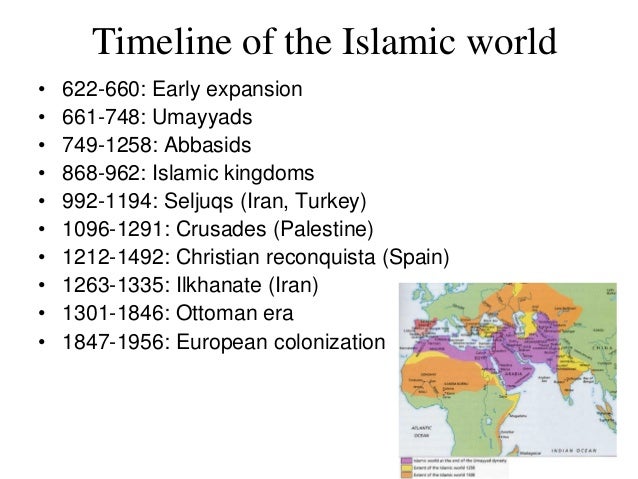


Muslim Spain phases:
1.The Al-Andalus province of the Umayyad Caliphate in Damascus (711–756)
2.The Independent Umayyad Emirate of Cordoba (756–929)
3.The Umayyad Caliphate of Córdoba (929–1031)
4.The first Taifas (1031–c. 1091)
5.The Almoravid rule (c. 1091–c. 1145)
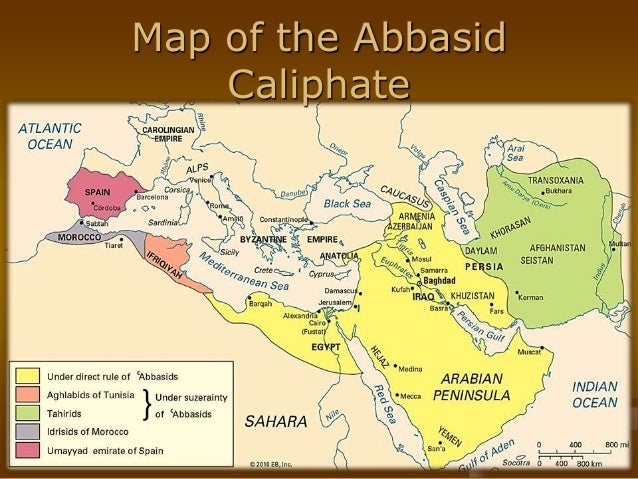

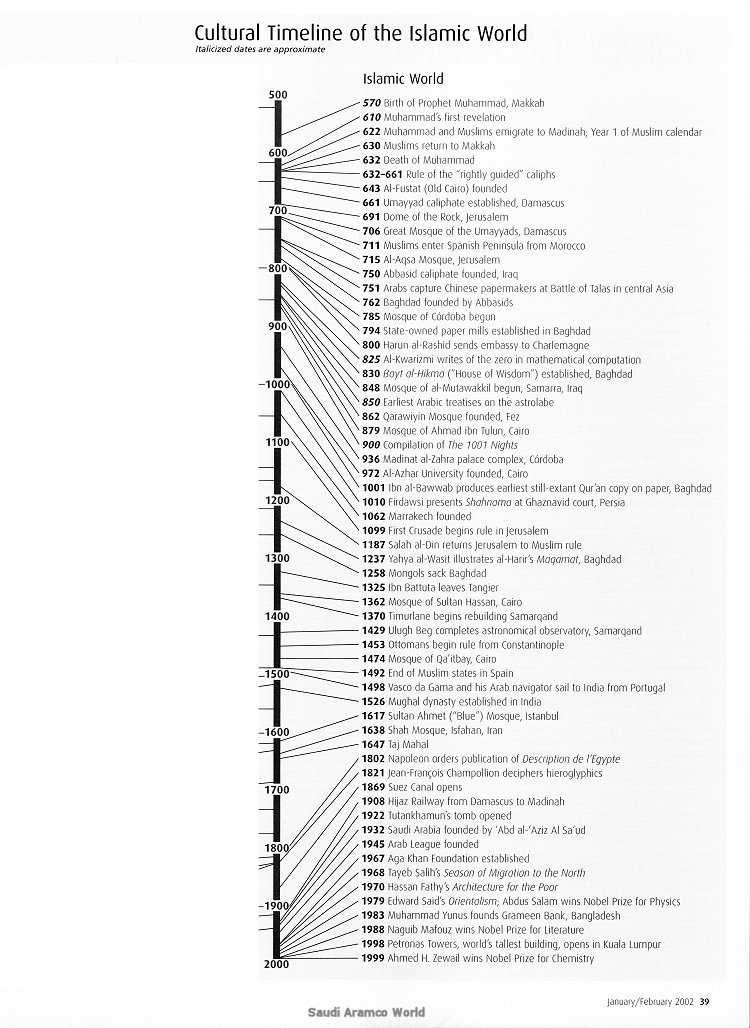
_______________________________________________
back to top
_______________________________________________
Nabi Muhammad saw : Age : 32 Belum ada maklumat more.......
. .
32 H : 11/8/652- 31/7/653
Rasyidun Dynasty : 11 to 40 H
Uthman ra : 23–35 H
Belum ada maklumat more........
. .
1 - 100 (623 - 719)
101 - 200 (720 - 816)
201- 300 (817 - 913)
301 - 400 (914 - 1010)
401 - 500 (1011 - 1107)
501 - 600 (1108 - 1204)
601 - 700 (1205 - 1301)
701 - 800 (1302 - 1398)
801 - 900 (1399 - 1495)
901 - 1000 (1496 - 1592)
1001 - 1100 (1593 - 1689)
1101 - 1200 (1690 - 1786)
1201 - 1300 (1787 - 1883)
1301 - 1400 (1884 - 1980)
1401 - 1500 (1981 - 2078)
| 570 | : 52 BH |
| Birth of Prophet Muhammad at Mecca | |
| 610 | : 12 BH |
| Revelation of the first versus of the Quran | |
| Ali ibn Abu Talib and Abu Bakar as Siddiq accept Islam | |
| 615 | : 7 BH |
| Conversion of Omar Ibn Al Khattab | |
| 620 | : 2 BH |
| A group of Muslims migrates to Abyssinia to escape the persecution in Mecca | |
| 622 | : 1 AH |
| Prophet Muhammad migrates to Madina | |
| Start of the Islamic calendar | |
| back to top | |
| 624 | : 2 AH |
| Battle of Badr | |
| 625 | : 3 AH |
| Battle of Uhud | |
| 626 | : 5 AH |
| Battle of Khandaq / Battle of the Trench | |
| 627 | : 6 AH |
| Prophet Muhammad concludes the Treaty of Hudaibiya with the Meccans | |
| 628 | : 7 AH |
| The Muslims reclaim Mecca | |
| The Prophet sends messages to Khosroe of Persia, Heraclius of Byzantium, Muqawqis of Egypt and the king of Yemen, inviting them to accept Islam | |
| 632 | : 11 AH |
| Farewell pilgrimage of Prophet Muhammad | |
| The last verse of the Quran is revealed | |
| Defensive expedition to Tabuk against the Byzantines ends in a stalemate and commander Zaid bin Harris is killed in action | |
| Prophet Muhammad passes away | |
| The Companions establish the Caliphate to affirm the historical continuity of Islam | |
| Abu Bakar as Siddiq is elected the first Caliph | |
| Death of Fatimah az Zahra beloved daughter of the Prophet,wife of Ali ibn Abu Talib | |
| 633 | : 12 AH |
| Abu Bakar conducts campaigns against eastern Arabs to ensure their compliance with zakat | |
| Rise of the false prophets | |
| Battle of Yamama against Musailimah Al Kazzab | |
| Abu Bakar authorizes the preparation of a written copy of the Quran, the Mashaf e Siddiqi | |
| 634 | : 13 AH |
| Muslim armies defeat the Byzantines at the Battle of Ajnadyn | |
| Abu Bakar passes away | |
| Omar ibn Al Khattab is elected the Caliph | |
| 635 | : 14 AH |
| Campaigns against eastern Roman and Persian Empires | |
| The Muslims capture Damascus | |
| 636 | : 15 AH |
| The Persian army is defeated at the Battle of Qadasia | |
| The Byzantines are defeated at the Battle of Yarmuk | |
| Jerusalem conquered by Arab armies. Freedom of worship is guaranteed to Christians. | |
| 637 | : 16 AH |
| The Muslims capture Madayen, capital of the Persian Empire | |
| 640 | : 19 AH |
| Omar bin al As begins campaigns in Egypt | |
| 641 | : 20 AH |
| Arab armies advance towards Khorasan, Afghanistan dan Sindh | |
| 642 | : 21 AH |
| The conquest of Egypt is completed | |
| Caliph Omar streamlines the administration of the vast empire | |
| Judical rulings of Omar ibn al Khattab and Ali ibn Abu Talib provide a basis for the sciences of Fiqh | |
| Persian armies defeated at the Battle of Nahawand | |
| 643 | : 22 AH |
| First construction of the Al Aqsa mosque in Jerusalem | |
| 644 | : 23 AH |
| Caliph Omar ibn Al Khattab is assassinated | |
| Uthman bin Affan is elected the Caliph | |
| 649 | : 28 AH |
| Cyprus is captured from the Byzantines | |
| 650 | : 29 AH |
| Pronunciation of Quranic verses standardized | |
| 31 H | : 24/8/651 - 11/8/652 CE |
|
32 H |
: 12/8/652 - 31/7/653 CE |
|
Death of Abu Dhar al Ghifari, venerated Companion and Sufi |
|
| 656 | : 36 AH |
| Caliph Uthman bin Affan is assassinated | |
| Ali ibn Abu Talib is elected the Caliph | |
| Beginning of the Civil Wars | |
| Caliph Ali ibn Abu Talib defeats dissidents under Aisha binti Abu Bakar at the Battle of the Camel | |
| 657 | : 37 AH |
| Muawiya ibn Abu Sufyan, governor of Syria, refuses to recognize the Caliphate of Ali | |
| Battle of Siffin between forces of Ali and Muawiya | |
| Beginning of the Kharijite schism | |
| 658 | : 38 AH |
| Ali ibn Abu Talib defeats the Kharijites at the Battle of Nahrawan | |
| Muawiya is declared the Caliph by his supporters in Damascus | |
| 659 | : 39 AH |
| Truce between Caliph Ali ibn Abu Talib and Muawiya ibn Abu Sufyan | |
| 661 | : 41 AH |
| Caliph Ali ibn Abu Talib is assassinated | |
| Age of Khulafa e Rashidoon ends | |
| Muawiya claims the Caliphate | |
| Beginning of the Umayyad dynasty | |
| Imam Hassan ibn Ali retires from politics | |
| 665 | : 45 AH |
| Muawiya orders the buildup of a navy | |
| 667 | : 47 AH |
| Muslim armies capture Khorasan | |
| 669 | : 49 AH |
| Death of Imam Hassan ibn Ali | |
| 670 | : 50 AH |
| Uqba bin Nafi begins the conquest of North Africa | |
| The city of Khairaoun in North Africa is founded | |
| 671 | : 51 AH |
| Muslim armies capture the island of Rhodes | |
| The first attempt to capture Constantinople fails | |
| 678 | : 58 AH |
| Death of Aisha binti Abu Bakar wife of Prophet Muhammad and the source of a large number of Hadith | |
| 680 | : 60 AH |
| Death of Muawiya ibn Abu Sufyan | |
| Yazid son of Muawiya becomes Omayyad ruler | |
| The tragedy of Karbala, Hussain ibn Ali,grandson of the Prophet is martyred | |
| Beginning of Yawm e Ashoora | |
| 683 | : 63 AH |
| Yazid sacks Madina | |
| Uqba bin Nafi conquers North Africa | |
| Death of Yazid: Muawiya II succeeds him | |
| 684 | : 64 AH |
| Marwan I becomes the Caliph | |
| 685 | : 65 AH |
| Abdul Malik becomes the Caliph | |
| Construction of the Dome of the Rock in Jerusalem | |
| Muslim armies advance into Central Asia | |
| 690 | : 71 AH |
| Omayyad armies reach the Atlantic Ocean | |
| 691 | : 72 AH |
| Dome of the Rock in Jerusalem is completed | |
| 692 | : 73 AH |
| Abdul Malik mints the first coins of the Islamic state | |
| 693 | : 74 AH |
| Al Hajjaj also known as al Hajjaj the cruel becomes governor of Iraq | |
| 694 | : 75 AH |
| Construction of the Omayyad Mosque in Damascus | |
| 699 | : 80 AH |
| Death of Al Juhani rationalist, philosopher | |
| back to top | |
| 705 | : 86 AH |
| Al Walid I becomes the Caliph and begins a vigorous expansion of the empire | |
| 711 | : 92 AH |
| Tariq ibn Ziyad lands in Spain. Visigoth army under Rodriguez is defeated at the Battle of Buhayrah | |
| Muhammad bin Qasim lands at Debal subdues Baluchistan , Sindh , Multan and southern Punjab | |
| 712 | : 93 AH |
| Musa ibn Nusair advances into Leon, Astoria, and Galicia | |
| Beginning of 780 years of Muslim rule in Andalus | |
| Jewish golden age in Spain | |
| Death of Imam Zainul Abedin | |
| 713 | : 94 AH |
| Zaid bin Zainul Abedin organizes resistance to the Omayyads. Beginning of the Zaidi branch. | |
| Muslim armies capture Lyons in France | |
| 714 | : 95 AH |
| Muhammad bin Qasim recalled from Sindh by Hajjaj bin Yusuf and imprisoned until death | |
| Muslims capture Normandy in France | |
| 715 | : 96 AH |
| Sulaiman becomes Umayyad Caliph | |
| Musa ibn Nusair recalled from Spain by Caliph Sulaiman, stripped of all power and banished into the desert | |
| 717 | : 98 AH |
| Omar bin Abdul Aziz becomes the Caliph and attempts reconciliation in the Islamic community. He lowers taxes on peasants in Persia and Egypt. | |
| The Byzantines repulse a second Muslim attempt to capture Constantinople. | |
| Spread of Islam into Persia and Egypt picks up momentum | |
| 719 | : 100 AH |
| Omar bin Abdul Aziz is poisoned | |
| Yazid II becomes the Caliph | |
| 720 | : 101 AH |
| Muslim armies cross the Pyrenees and occupy southern France | |
| 724 | : 106 AH |
| Hisham becomes the Caliph | |
| 728 | : 110 AH |
| Death of Hasan al Basri,well known Sufi Shaykh | |
| 731 | : 113 AH |
| Death of Imam al Baqir | |
| 732 | : 114 AH |
| Charles Martel stops the Muslim advance into Europe at the Battle of Tours | |
| 735 | : 117 AH |
| Muslim armies advance through southern France and occupy mountain passes in Switzerland | |
| 740 | : 122 AH |
| Death of Imam Zaid bin Zain ul Abedin | |
| 743 | : 125 AH |
| Al Walid II becomes the Caliph | |
| 744 | : 126 AH |
| Abu Muslim is appointed the chief dayee of Khorasan | |
| Yazid III, Ibrahim and Marwan II become the Caliphs in rapid succession | |
| 745 | : 127 AH |
| Imam Jaafar as Saadiq discusses Fiqh issues in his study circles. Imam Abu Haneefa participates in these studies and benefits from them. | |
| 746 | : 128 AH |
| Beginning of the Abbasid revolution in Khorasan | |
| 747 | : 129 AH |
| Kufa falls to the Abbasids. Abu Muslim nominates Abul Abbas as the first Abbasid Caliph | |
| 750 | : 132 AH |
| The Abbasid Revolution | |
| The Abbasid forces defeat the Caliph Marwan at the Battle of Kushaf. The Umayyads are swept away from power and are slaughtered | |
| Andur Rahman I escapes to Spain | |
| Beginning of the Abbasid Caliphate in Baghdad. Abu Abbas al Saffah becomes the first Abbasid Caliph | |
| 751 | : 133 AH |
| Battle of Tlas.The Muslim armies are victorious over the forces of the Tang Empire. China cedes Central Asia to the Caliphate | |
| Systematic development of Fiqh begins | |
| 754 | : 136 AH |
| Al Mansur becomes the Caliph,sends troops into China in response to a request for help from the Tang Emperor Tsung. | |
| 755 | : 138 AH |
| The Umayyad Abdur Rahman I establishes the Umayyad Emirate in Cordoba Spain | |
| 759 | : 142 AH |
| The Franks recapture Narbonne from the Muslims | |
| 760 | : 143 AH |
| Death of Imam Ismail, son of Imam Jaafar as Saadiq | |
| Beginning of the Fatimid branch among Muslims | |
| 763 | : 146 AH |
| Baghdad becomes the seat of the Caliphate and the cradle of Islamic civilization | |
| 765 | : 148 AH |
| Death of Imam Jaafar as Saadiq one of the principal sources of Fiqh. Caliph al Mansur establishes schools of translation in Baghdad. | |
| Muslims come into contact with Greek philosophy and Indian mathematics | |
| 768 | : 151 AH |
| Death of Imam Abu Haneefa after whom the Hanafi school of Fiqh is named. | |
| Charlemagne ( 768-814) ascends the Frankish throne. | |
| 775 | : 158 AH |
| Al Mahdi becomes the Caliph | |
| 778 | : 161 AH |
| Charlemagne of France raids Muslim Spain | |
| 780 | : 163 AH |
| Charlemagne invades German territories and converts the Germans to Christianity | |
| 781 | : 164 AH |
| Ibn Jabir invents the science of chemistry | |
| 785 | : 168 AH |
| Al Hadi becomes the Caliph | |
| 786 | : 169 AH |
| Harun al Rashid becomes the Caliph. Golden age of Baghdad | |
| 788 | : 172 AH |
| Beginning of the Idrisid dynasty in North Africa | |
| 790 | : 174 AH |
| The manufacture of paper is introduced into Baghdad from China | |
| 795 | : 179 AH |
| Death of Imam Malik bin Anas, after whom the Maliki school of Fiqh is named | |
| 799 | : 183 AH |
| Zubaida, wife of Harun al Rashid performs the Hajj and builds rest houses for hajjis on the road | |
| Death of Imam Muza al Kazim | |
| 800 | : 184 AH |
| Harun al Rashid and Charlemagne exchange ambassadors | |
| 801 | : 185 AH |
| The city of Fez is established | |
| Charlemagne begins an invasion of Muslim Spain | |
| 802 | : 186 AH |
| Death of Rabia al Adawiya one of the most celebrated spiritual luminaries and a teacher of Sufi masters | |
| 809 | : 193 AH |
| Death of Harun al Rashid. Al Amin becomes the Caliph in Baghdad | |
| 813 | : 197 AH |
| Al Mamun succeeds his brother Al Amin as the Caliph | |
| 814 | : 198 AH |
| Death of Charlemagne. The Carolingian Empire in Europe begins to disintegrate | |
| 815 | : 199 AH |
| Al Khwarizmi invents the science of Algebra and develops the mathematics of equations | |
| Viking raids from the North ravage Europe | |
| The Abbasid Empire begins a slow process of disintegration. The Idrisids in North Africa and the Tahirids in Persia become autonomous | |
| 818 | : 202 AH |
| Death of Imam Ali al Rida | |
| 820 | : 205 AH |
| Death of Imam al Shafie after whom the Shafie school of Fiqh is named. | |
| Rise of the Aghlabids in North Africa | |
| 822 | : 207 AH |
| Music flourishes at the court of Cordoba under the musician al Zirhab | |
| The Aghlabid armies from North Africa invade Sicily | |
| 827 | : 212 AH |
| Caliph al Mamun adopts Mutazilite doctrines as court dogma | |
| The Idrisids capture Crete, Sardinia and Sicily | |
| 830 | : 215 AH |
| Caliph al Mamun patronizes the Bait ul Hikmah (House of Wisdom) in Baghdad and encourages translation of Greek and Sanskrit books into arabic. The Muslims develop concept of decimals in mathematics | |
| 831 | : 216 AH |
| Muslims capture Palermo Italy | |
| 833 | : 218 AH |
| Death of Al Mamun. Al Mutasim becomes the Caliph and enlists Turks into the army | |
| 835 | : 220 AH |
| Death of Imam al Jawwad | |
| 838 | : 223 AH |
| Umayyad armies from Spain occupy Marseilles France | |
| 840 | : 225 AH |
| Death of Al Khwarizmi mathematician , Sufi Shaykh | |
| 842 | : 227 AH |
| Al Wathiq becomes the Caliph | |
| 846 | : 231 AH |
| The Aghlabids in North Africa occupy Pisa and conduct a raid on Rome | |
| 847 | : 232 AH |
| Al Mutawakkil becomes the Caliph abandons Mutazilite doctrines | |
| 850 | : 235 AH |
| Turkish influence in the Caliphate grows | |
| 855 | : 241 AH |
| Death of Imam ibn Hanbal after whom the Hanbali school of FIqh is named | |
| 861 | : 247 AH |
| University of Kairaouine ( established 859 CE ) in Fes Morocco. Caliph al Mutawakkil is murdered in Baghdad. Al Muntasir becomes the Caliph | |
| 866 | : 252 AH |
| Al Mutaz becomes the Caliph | |
| 868 | : 254 AH |
| Egypt becomes autonomous under the Tulunids | |
| Palermo in Sicily becomes a center of Islamic learning | |
| Death of Imam al Hadi | |
| 870 | : 256 AH |
| The Zanj workers from East Africa revolt in Iraq | |
| Death of Al Farabi and Al Kindi noted men of science | |
| Death of Al Tabari renowned physician | |
| The Muslims capture Malta | |
| Al Mutamid becomes the Caliph in Baghdad | |
| 874 | : 260 AH |
| Death of Abul Hussain Muslim, compiler of Hadith | |
| Death of Imam al Askari | |
| Death of Al Kindi mathematician astronomer | |
| Death of Al Bistami one of the most celebrated Sufi Shaikhs | |
| 875 | : 261 AH |
| Hamdan Karamat starts the Karamatian movement | |
| The Sassanids establish themselves in Bokhara | |
| 878 | : 264 AH |
| Disappearance of Imam al Muntazar the Twelth Imam | |
| Beginning of belief in the hidden Imam | |
| 880 | : 266 AH |
| The Aghlabids lose southern Italy to Christian forces | |
| 882 | : 268 AH |
| A rebellion of the Zanj in Iraq is crushed | |
| 885 | : 272 AH |
| Death of Dawud ibn Khalaf expounder of the Zahiri school of Fiqh | |
| 887 | : 274 AH |
| Peasant revolt in China against foreigners forces out the Muslims of Canton | |
| 889 | : 276 AH |
| Death of Ibn Kutaiba historian | |
| 890 | : 277 AH |
| Spanish Muslims re-establish bases in southern France and conduct raids into Switzerland | |
| 892 | : 279 AH |
| Death of Muhammed al Tharmidi historian | |
| Al Mutadid becomes the Caliph | |
| 893 | : 280 AH |
| The Karamatians capture Yemen | |
| 898 | : 285 AH |
| Imam al Hadi Yahya establishes a Zaidi state in Yemen | |
| 900 | : 287 AH |
| The Arabian Nights are compiled | |
| Improvements appear in the design and use of the Astrolabe | |
| The Kharijites establish a dynasty in Sijilmasa North Africa | |
| 901 | : 288 AH |
| The Samanids emerge in Khorasan Persia | |
| 902 | : 289 AH |
| Al Muktafi becomes the Caliph | |
| 903 | : 290 AH |
| The Karamatians plunder Damascus | |
| 904 | : 291 AH |
| Muslim armies capture Solonika from the Byzantines | |
| 907 | : 294 AH |
| Abu Abdullah Fatimid leader moves to North Africa | |
| 908 | : 295 AH |
| Al Muqtadir becomes the Caliph in Baghdad | |
| 909 | : 296 AH |
| The Fatimids establish themselves in North Africa | |
| Ubaidulla al Mahdi becomes the first Fatimid Caliph | |
| 910 | : 297 AH |
| Al Razi conducts research into infectious diseases including small pox,rabies and the plague | |
| 912 | : 299 AH |
| Reign of Abdul Rahman III in Spain (912 - 961). Cordoba becomes the premier city of Europe. Golden age of Spain. Science and civilization thrive. | |
| 914 | : 301 AH |
| Nasr al Saeed of the Samanids in Khorasan favors the Fatimids over the Abbasids | |
| 915 | : 302 AH |
| The Kharijites establish themselves in southern Morocco | |
| The Fatimids raid Egypt | |
| 922 | : 310 AH |
| Mansur al Hallaj Persian mystic is executed for his esoteric views | |
| Beginning of the Tahirid dynasty in Iraq | |
| 923 | : 311 AH |
| Death of Abu Tabari, noted commentator on the Quran | |
| 925 | : 313 AH |
| Death of Al Razi doctor of medicine | |
| 929 | : 317 AH |
| In response to Fatimid claims to the Caliphate, Abdul Rahman III of Spain assumes the title of Caliph and protector of Sunni Muslims in North Africa | |
| 930 | : 318 AH |
| The Karamatians raid Mecca and carry off the Hijr e Aswad from the Haram to Bahrain | |
| 931 | : 319 AH |
| Abdur Rahman III occupies Ceuta | |
| The Fatimids capture Algeria | |
| 932 | : 320 AH |
| The Buyids establish their rule in southern Iraq | |
| Al Qahir becomes the Caliph in Baghdad | |
| 933 | : 321 AH |
| The Ishkedids displace the Tulunids in Egypt and rule until 969 | |
| 934 | : 322 AH |
| Al Radi becomes the Abbasid Caliph | |
| Al Qaim becomes the Fatimid Caliph | |
| 936 | : 324 AH |
| Death of Al Ashari (874-936), highly influential theologian who reconciled Mutazilite doctrines with orthodox theology. Author of ''occasionalism' in philosophy | |
| 939 | : 327 AH |
| Abdul RAhman III of Spain captures Fraxinetum, Valais,Geneva, Toulon and Great St. Bernard | |
| 940 | : 328 AH |
| Extensive postal services are established by the Abbasids | |
| Al Muttaqi becomes the Abbasid Caliph | |
| 945 | : 333 AH |
| The Buyids temporarily capture Baghdad | |
| 946 | : 334 AH |
| Al Mutee becomes the Abbasid Caliph | |
| Al Mansur becomes the Fatimid Caliph | |
| 950 | : 338 AH |
| Death of Al Farabi , noted scientist, philosopher, jurist,author of treatises on ethics, music and logic, Sufi Shaykh | |
| 951 | : 340 AH |
| The Ikhwan as Safa in Iraq compile an Ecyclopedia of Knowledge | |
| 953 | : 342 AH |
| Al Muiz becomes the Fatimid Caliph in North Africa | |
| 955 | : 344 AH |
| Sharp naval engagements between the navies of Al Muiz and Abdul Rahman III off the coast of Spain | |
| 957 | : 346 AH |
| Al Masudi, the historian, passes away | |
| 961 | : 350 AH |
| Death of Abdul Rahman III | |
| The Oghuz family of Turks in Central Asia accepts Islam | |
| 962 | : 351 AH |
| The Seljuk, Alaptagin, establishes a kingdom in Ghazna Afghanistan | |
| 968 | : 357 AH |
| The Umayyads establish a university in Cordoba | |
| 969 | : 358 AH |
| The Fatimids conquer Egypt and establish the city of Cairo | |
| 970 | : 359 AH |
| The Fatimids capture Syria, Mecca and Madina and lay claim to the leadership of the Islamic world. Fatimid rule in Multan ( modern Pakistan ). Brisk trade between Alexandria, Egypt and Venice, Italy | |
| 971 | : 360 AH |
| The Fatimids establish Al-Azhar University in Cairo | |
| 974 | : 363 AH |
| Al Ta'ee becomes the Abbasid Caliph | |
| 975 | : 364 AH |
| Death of Al Muiz, Fatimid Caliph of Egypt. Al Aziz becomes the Fatimid Caliph | |
| Muslim astronomers publish manuscripts showing constellations of stars | |
| 988 | : 378 AH |
| Count Vladimir of Kiev embraces Eastern Orthodox Christianity | |
| 991 | : 381 AH |
| Al Qadir becomes the Abbasid Caliph | |
| 996 | : 386 AH |
| Al Hakim becomes the Fatimid Caliph | |
| Pope Pious XI declares the Crusades against Muslim | |
| 997 | : 387 AH |
| Mahmud succeeds Alaptagin in Ghazna and dominates Central Asia | |
| 999 | : 389 AH |
|
Large scale Turkish migrations into Central Asia. |
|
|
Kara Khani Turks occupy Bukhara. |
|
|
Mahmud of Ghazna annexes Khorasan. |
|
| 1000 | : 390 AH |
|
Mahmud makes the first of seventeen raids into India. |
|
|
The Chinese use gunpowder to propel arrows. |
|
| 1001 | : 391 AH |
|
Mahmud starts campaigns to capture Peshawar, Bhera, Nagarkot, Tarain, Thaneshwar and Kanauj in India. |
|
| 1004 | : 394 AH |
|
Mahmud defeats Dawud, Fatimid ruler of Multan. |
|
| 1016 | : 407 AH |
|
The Christians reclaim Sardinia. |
|
| 1017 | : 408 AH |
|
Beginning of the Druze sect in Lebanon. |
|
| 1020 | : 411 AH |
|
Death of Firdowsi of Persia, author of Shah Nama. |
|
|
Mahmud establishes Lahore as the capital of Punjab. |
|
|
Death of Fatimid Caliph al Hakim who had claimed divinity. |
|
| 1021 | : 412 AH |
|
Al Zahir becomes the Fatimid Caliph. |
|
| 1024 | : 415 AH |
|
Mahmud raids temple of Somanath in Gujrat, India. |
|
| 1025 | : 416 AH |
|
Al Baruni publishes Kitab ul Hind, a penetrating study of the people of India. |
|
| 1030 | : 421 AH |
|
Death of Mahmud of Ghazna. |
|
| 1031 | : 422 AH |
|
The Umayyad Caliphate of Cordoba disintegrates. Spain breaks up into petty emirates. The Christian kingdoms of Castille, Leon and Portugal position themselves to attack the Muslim territories. |
|
|
Al Qaim becomes the Abbasid Caliph in Baghdad. |
|
| 1032 | : 423 AH |
|
The Church of Constantinople breaks with the Church of Rome over the issue of icons in the Church. |
|
| 1036 | : 427 AH |
|
Taghril Beg becomes Seljuk Sultan. |
|
|
Al Mustansir becomes the Fatimid Caliph. |
|
| 1037 | : 428 AH |
|
Death of Abu Ali ibn Sina, one of the greatest of physicians. |
|
|
Ferdinand I, king of Castille, captures Leon. |
|
| 1038 | : 429 AH |
|
Death of Al Hazen, noted physicist. |
|
| 1043 | : 434 AH |
|
The Fatimid Empire begins to crumble. Mecca, Madina, Yemen and North Africa are lost by the Fatimids. |
|
| 1048 | : 440 AH |
|
Death of al Bairuni, historian, author of Kitab ul Hind. |
|
| 1050 | : 442 AH |
|
The Christians advance in Sicily. |
|
| 1051 | : 443 AH |
|
Beginning of the Murabitun revolution in West Africa. |
|
| 1056 | : 448 AH |
|
The Seljuk Taghril Beg and the Buyid Basisiri contest the control of Baghdad. |
|
| 1058 | : 450 AH |
|
Taghril Beg is anointed by Abbasid Caliph Kaim as “sultan of the east and the west” for his role in protecting the Abbasid Caliphate. |
|
| 1060 | : 452 AH |
|
The Seljuk Turks advance into Persia, Azerbaijan and Armenia. |
|
|
The Crusaders raid the coast of North Africa. |
|
| 1061 | : 453 AH |
|
The Murabitun capture Morocco. |
|
|
The Murabitun establish the city of Marrakesh as their capital. |
|
| 1063 | : 455 AH |
|
Taghril Beg dies childless. His nephew Alap Arsalan becomes the Seljuk sultan. |
|
| 1068 | : 460 AH |
|
Beginning of the Songhay Empire in West Africa. |
|
| 1072 | : 464 AH |
|
Battle of Manzikert. The Seljuk Turks under Alap Arsalan defeat the Byzantines under Emperor Romanus and open up Anatolia for Turkish settlement. |
|
|
The Christians capture Palermo in Sicily. |
|
| 1075 | : 467 AH |
|
The Seljuk Sultan Malik Shah retakes Syria from the Fatimids. |
|
|
Al Muqtadi becomes the Abbasid Caliph. |
|
| 1077 | : 469 AH |
|
Birth of Abdul Qader Jeelani, celebrated Sufi sage. |
|
| 1085 | : 478 AH |
|
Alfonso I of Castile captures Toledo, the ancient capital of Visigoth Spain. The extensive libraries of Toledo become accessible to Christian Europe. |
|
| 1086 | : 479 AH |
|
The Murabitun emir, Yusuf bin Tashfin, advances into Spain at the head of a powerful African force. |
|
|
The Nizamiya College is founded in Baghdad by Nizam ul Mulk, grand vizier to Sultan Malik Shah. |
|
| 1087 | : 480 AH |
|
Yusuf bin Tashfin defeats Alfonso VI at the Battle of Sagrajas. |
|
|
The Crusaders sack Mahdiya in North Africa. |
|
|
The assassin terror grows in Iraq and Syria. |
|
| 1090 | : 483 AH |
|
Al Ghazzali teaches at NizamiyaCollege, Baghdad. |
|
|
The Crusaders capture Malta. |
|
|
The assassins capture Alamut in northern Syria and establish a training center for fidayees. |
|
| 1091 | : 484 AH |
|
End of Muslim presence in Sicily. |
|
|
Smyrna in Anatolia becomes the Seljuk capital. |
|
|
Death of Sultan Malik Shah. |
|
|
The assassins murder grand vizier Nizam ul Mulk. |
|
| 1094 | : 487 AH |
|
Al Mustansir becomes the Abbasid Caliph in Baghdad. |
|
|
Al Mustadi becomes the Fatimid Caliph in Cairo. |
|
| 1095 | : 488 AH |
|
Pope Urban II declares a Crusade to take Jerusalem. |
|
|
Al Afdal, grand vizier of Fatimid Egypt, recaptures Jerusalem from Turkish emir Duqaq of Damascus. |
|
| 1096 | : 489 AH |
|
The start of the First Crusade. |
|
| 1097 | : 490 AH |
|
Konya Anatolia becomes the Seljuk capital. |
|
| The Turks retreat before the advancing Crusaders. | |
| The Fatimids in Egypt start negotiations with the Crusaders to divide up Seljuk territories. | |
| 1098 | : 491 AH |
|
The Crusaders capture Antioch. |
|
| 1099 | : 492 AH |
|
Jerusalem falls to the Crusaders. The Muslims and the Jews are massacred. Baldwin becomes king of Jerusalem. |
|
| 1100 | : 493 AH |
|
Al Ghazzali writes a powerful diatribe, Tahaffuz al Falsafa, against speculative philosophy. In Ihya al Uloom, he accords tasawwuf an honored position in the Islamic sciences. |
|
| 1106 | : 499 AH |
|
Death of Yusuf bin Tashfin, emir of the Murabitun. |
|
| 1111 | : 504 AH |
|
Abu Hamid al Ghazzali dies after transforming the intellectual landscape of the Islamic world. |
|
| 1113 | : 507 AH |
|
Maudud, a Seljuk officer from Mosul, defeats King Baldwin of Jerusalem. |
|
| 1118 | : 512 AH |
|
Al Mustarshid, Abbasid Caliph in Baghdad. |
|
| 1123 | : 517 AH |
|
Death of Omar al Khayyam, mathematician, mystic. |
|
| 1124 | : 518 AH |
|
Death of Hassan al Sabbah, leader of the Assassins. |
|
| 1126 | : 520 AH |
|
Archbishop Raymond establishes a school in Toledo to translate Arabic books into Latin. |
|
| 1127 | : 521 AH |
|
The Assassins murder Turkish officer Maudud. |
|
| 1130 | : 524 AH |
|
Death of ibn Tumart, leader of the Al Muhaddithin. |
|
| 1132 | : 526 AH |
|
Roger II of Sicily invites Muslim scholars to work at his court. |
|
| 1139 | :533 AH |
|
Birth of Khwaja Moeenuddin Chishti, Sufi sage. |
|
| 1141 | : 535 AH |
|
The Kara Kitai Turkomans defeat the Seljuks at Amu Darya. |
|
| 1144 | : 538 AH |
| The Seljuks, under Zengi, recapture Edessa. | |
| Pope Eugene declares the Second Crusade. | |
| 1145 | : 539 AH |
| The Second Crusade collapses in Anatolia but succeeds in capturing Lisbon in Portugal. | |
| End of the Murabitun rule in Andalus. | |
| 1146 | : 541 AH |
| The al Muhaddithin captures Morocco. | |
| The assassins murder Seljuk Emir Zengi. | |
| 1149 | : 544 AH |
|
Al Zafir becomes the Fatimid Caliph. |
|
| 1150 | : 545 AH |
|
The University of Paris is established. |
|
| 1151 | : 546 AH |
|
Al Idrisi constructs a map of the then known world. |
|
| 1154 | : 549 AH |
| The Kurdish officer Nuruddin, in Seljuk service, takes Damascus. | |
| Al Faiz becomes the Fatimid Caliph in Cairo. | |
| 1157 | : 552 AH |
|
The al Muhaddithin captures Andalus. |
|
| 1160 | : 555 AH |
| Al Mustanjid becomes the Abbasid Caliph in Baghdad. | |
| Al Adid, the last of the Fatimids, becomes the Caliph in Cairo. | |
| 1163 | : 558 AH |
|
The Seljuks and the Crusaders compete for influence in Fatimid Egypt. |
|
| 1166 | : 561 AH |
| Death of Shaykh Abdul Qader Jeelani of Baghdad, called Shaykh ul Mashaiq, founder of the Qadariya Sufi order. | |
| Death of the geographer, al Idrisi. | |
| 1167 | : 562 AH |
| Establishment of Oxford University in England. | |
| 1170 | : 565 AH |
| Salahuddin takes Egypt from the Fatimids. | |
| Al Mustadi becomes the Abbasid Caliph in Baghdad. | |
| 1171 | : 566 AH |
| End of the Fatimid era. Egypt reverts to the Abbasid Caliphate. | |
| 1173 | : 568 AH |
| Ghiasuddin Ghori established the kingdom of Ghor in Afghanistan. | |
| 1175 | : 570 AH |
| Salahuddin consolidates his hold on Syria and Egypt. | |
| Death of Ahmed al Rifai, founder of the Rifaiyah Sufi brotherhood. | |
| 1177 | : 572 AH |
| Muhammed Ghori adds Multan, Uch, Dera Ismail Khan and Sindh to his dominions. | |
| 1179 | : 575 AH |
| Muhammed Ghori starts campaigns to capture Peshawar and Sialkot. | |
| 1182 | : 578 AH |
| Khwaja Muhammed Ghouse of Sindh introduces the Qadariya order into India and Pakistan. | |
| 1187 | : 583 AH |
| Battle of Hittin. Salahuddin triumphs and recaptures Jerusalem. | |
| Muhammed Ghori captures Lahore. | |
| 1188 | : 584 AH |
| Pope Clement III launches the Third Crusade. | |
| 1189 | : 585 AH |
| Khwaja Moeenuddin Chisti moves to Ajmer, India and establishes the Chistiya order. | |
| 1190 | : 586 AH |
| King Richard of England proposes a marriage between his sister and Saifuddin, brother of Salahuddin and for the two together to rule Jerusalem. The proposal is opposed by the Crusaders and is abandoned. | |
| 1191 | : 587 AH |
| Accra surrenders to the Crusaders after a long siege. | |
| Mohammed Ghori suffers a defeat at the Battle of Tarain and is forced to withdraw towards Kabul. | |
| 1192 | : 588 AH |
| Muhammed Ghori, victorious over the Rajputs, captures Delhi. Prithvi Raj Chauhan, ruler of Ajmer and Delhi is slain. | |
| 1193 | : 589 AH |
|
Salahuddin passes away and is buried in Damascus. |
|
| 1196 | : 592 AH |
| The al Muhaddith emir al Mansur defeats the Crusaders at the Battle of Alarcos. | |
| 1198 | : 594 AH |
| Death of ibn Rushd, of the great world philosophers. | |
| 1199 | : 595 AH |
| Pope Innocent III declares the Fourth Crusade. | |
| 1200 | : 596 AH |
| Islam takes roots in Indonesia. | |
| Alauddin Muhammed becomes the Shah of Khwarazm. | |
| The Crusaders capture Valencia. | |
| Cambridge University is established in England. | |
| 1201 | : 597 AH |
| The Latin Crusaders sack Zara, a Christian city on the Adriatic. | |
| 1202 | : 598 AH |
| The Delhi Sultanate is established. | |
| 1203 | : 599 AH |
| Death of Nizami, well known Farsi poet. | |
| 1204 | : 600 AH |
| The Crusaders, led by Dondolo of Venice, sack Constantinople and loot its treasures. | |
| Johan Shah, ruler of Sumatra, accepts Islam. | |
| 1205 | : 601 AH |
| The Turkoman Kara Kitai defeats Mohammed Ghori. | |
| The Ghorids put down a rebellion in the Punjab. | |
| 1206 | : 602 AH |
| Genghiz Khan becomes the supreme ruler of the Mongol tribes. | |
| The assassins murder Muhammed Ghori. | |
| The Delhi sultans advance towards Bengal. | |
| 1211 | : 608 AH |
| Altumish ascends the throne of Delhi. | |
| 1212 | : 609 AH |
| The Crusaders defeat the al Muhaddith at the Battle of Las Novas de Tolosa. | |
| 1215 | : 612 AH |
| Genghiz Khan captures northern China; learns the use of gunpowder from the Chinese. | |
| 1218 | : 615 AH |
| The Fifth Crusade is directed against Egypt. The Egyptians open the Nile docks and drown the invaders. | |
| 1219 | : 616 AH |
| Genghiz Khan invades the territories of Shah Muhammed of Khorasan. | |
| 1220 | : 617 AH |
| Genghiz Khan devastates Central Asia. | |
| 1221 | : 618 AH |
| Genghiz Khan destroys Persia and Afghanistan. | |
| Prince Jalaluddin faces the Khan at the Battle of the Indus. | |
| 1222 | : 619 AH |
| Genghiz Khan returns to Mongolia. | |
| 1223 | : 620 AH |
| Ibn al Athir, celebrated historian, passes away. | |
| 1227 | : 624 AH |
| Death of Genghiz Khan. The Mongols continue their advance through West Asia and Eastern Europe. | |
| 1228 | : 625 AH |
| The Sixth Crusade, directed at Egypt and led by Emperor Frederick II of Germany fails. | |
| 1230 | : 627 AH |
| Sundiata starts consolidation of the Empire of Mali. | |
| 1235 | : 632 AH |
| Baba Fareed of Lahore becomes heads of the Chistiya order in India. | |
| 1236 | : 633 AH |
| Cordoba, capital of Muslim Spain, falls to the Crusaders. | |
| Razia rules as Queen of India. | |
| Death of Khwaja Moeenuddin Chishti of Ajmer, the most celebrated awliya of the subcontinent. | |
| Al Mustansir becomes the Caliph in Baghdad. | |
| 1240 | : 637 AH |
| Death of ibn al Arabi, renowned Sufi Shaykh. | |
| Roger Bacon teaches in England. | |
| 1242 | : 639 AH |
| Al Musta’sim becomes the 37th and the last Abbasid Caliph in Baghdad. | |
| 1245 | : 643 AH |
| At the Council of Lyons, Christian Europe resolves to seek an alliance with the Mongols against the Muslims. A Franciscan priest, John de Plano Carpini, arrives at the Mongol court to seek military assistance. | |
| 1248 | : 646 AH |
| Seville in Spain falls to the Christians. | |
| Ibn Ahmar starts the Nasirid dynasty in Granada. | |
| 1249 | : 647 AH |
| The Seventh Crusade, directed at Egypt by the Franks, is beaten back. | |
| 1250 | : 648 AH |
| Shajarat al Durr rules as Queen of Egypt. | |
| 1251 | : 649 AH |
| Hulagu Khan becomes the Mongol lord of Persia and Central Asia. | |
| 1256 | : 654 AH |
| Hulagu Khan destroys the Assassins. | |
| 1257 | : 655 AH |
| Death of Shaykh Saadi, celebrated Farsi poet. | |
| Nizamuddin Awliya becomes head of the Chishtiya order in Delhi. Islam spreads in India. | |
| 1258 | : 656 AH |
| Hulagu Khan sacks Baghdad. End of the Abbasid Caliphate of Baghdad. The curtain falls on the classic Islamic civilization. Caliph al Musta’sim is killed. | |
| Death of Ali al Shadhuli, founder of the Shadhuli Sufi order. | |
| 1260 | : 658 AH |
| Kublai Khan ascends the throne of China. Many capable Muslims work at the court of the Great Khan. | |
| Hulagu Khan storms Aleppo and massacres its inhabitants. | |
| 1261 | : 659 AH |
| The Mamlukes of Egypt install Al Mustansir as the Abbasid Caliph in Cairo. | |
| The Mamluke, Zahir Baybars of Egypt, defeats a combined army of Mongols, Armenians and Crusaders at the Battle of Ayn Jalut. | |
| 1265 | : 663 AH |
| Death of Hulagu Khan. | |
| 1269 | : 667 AH |
| The Merinide al Yakub captures Marrakesh. | |
| 1273 | : 671 AH |
| Death of Jalaluddin Rumi, author of Mathnavi, the most celebrated of Farsi poets and founder of the Maulavi Sufi order. | |
| 1274 | : 672 AH |
| Death of al Tusi, astronomer and inventor of the 2-axis gimbal. | |
| Emir al Yaqub of the Merinides defeats the Christians at the Battle of Ecija. | |
| 1277 | : 676 AH |
| Sultan Baybars defeats the Mongol armies at the Battle of Abulistan. | |
| 1278 | : 677 AH |
| Death of Sultan Baybars. | |
| 1289 | : 688 AH |
| The Mamlukes captures Acre, last Crusader stronghold in Syria. | |
| 1290 | : 689 AH |
| Sultan Malik Shah rules in Sumatra. | |
| 1291 | : 690 AH |
| Death of Shaykh Saadi, well known Farsi poet. | |
| 1294 | : 693 AH |
| Marco Polo returns to Italy from journey to the East. | |
| 1295 | : 694 AH |
| Ghazan the Great, the Il Khan Emperor, accepts Islam. | |
| 1300 | : 699 AH |
| Alauddin Khilji consolidates his empire over the subcontinent. Malik Kafur advances into southern India. | |
| 1301 | : 700 AH |
| Uthman Ghazi, founder of the Ottoman Empire, consolidates his holdings around Burs and Eskishehir; he defeats the Byzantines at the Battle of Yalakova. | |
| The Mamlukes triumph over the Il Khans at the Battle of Marj as Suffar. | |
| 1307 | : 706 AH |
| Mansa Musa becomes emperor of Mali. | |
| 1316 | : 716 AH |
| Death of Alauddin Khilji, emperor of India. | |
| 1320 | : 720 AH |
| The Khilji dynasty in India collapses. | |
| Beginning of the Tughlaq dynasty. | |
| 1324 | : 724 AH |
| Mansa Musa performs his hajj with an entourage of 12000. | |
| 1325 | : 725 AH |
| Death of Nizamuddin Awliya of Delhi. | |
| Ibn Batuta begins his journey around the world. | |
| Death of Amir Khusroe ,famed Sufi poet of India | |
| 1326 | : 726 AH |
| Death of Uthman I, founder of the Ottoman Empire. His successor Sultan Orkhan captures Bursa. | |
| Death of ibn Taymiyah, noted scholar, considered to be the founder of the “salafi” school of thought. | |
| 1333 | : 733 AH |
| Yusuf I becomes emir of Granada, breaks with Castille, forms an alliance with the sultan of Morocco and makes a last attempt to capture Spain from the Christians. | |
| 1334 | : 734 AH |
| Ibn Batuta arrives in Delhi. | |
| Death of Shaykh Safiuddin Ishaq, after whom the Safavid dynasty of Persia is named. | |
| 1335 | : 735 AH |
| Death of Abu Said, Il Khanid Prince. | |
| 1340 | : 740 AH |
| The Yuan Emperor Toghon Timur of China sends an embassy to the court of Muhammed bin Tughlaq of India. | |
| The Merinide navy defeats the Spaniards at the Battle of Tarifa. | |
| 1341 | : 742 AH |
| Death of Sultan ibn Qalawun of Egypt. | |
| 1345 | : 746 AH |
| Ibn Batuta visits Sultan Malik al Zahir of Pasai Indonesia. | |
| 1346 | : 747 AH |
| The Black Plague devastates Europe. | |
| 1351 | : 752 AH |
| Death of Muhammed bin Tughlaq of India. The Tughlaq Empire begins to disintegrate. | |
| 1354 | : 755 AH |
| Ibn Batuta visits the Empire of Mali. | |
| The Ottomans capture Gallipoli and Ankara. | |
| 1355 | : 756 AH |
| Ibn Batuta returns to Tangier. The Merinide Sultan Abu Inan authorizes the writing of the Rehla of Ibn Batuta. | |
| The Genoese briefly occupy Tripoli, Libya. | |
| 1357 | : 758 AH |
| The Ottomans capture Erdirne. | |
| 1368 | : 769 AH |
| Timurlane, elected the leader of the Tatars, consolidates his hold on the valley of Farghana in Uzbekistan. | |
| 1369 | : 770 AH |
| Death of ibn Batuta. | |
| 1375 | : 777 AH |
| Dimitrius, Count of Moscow, wins a victory over the Tatar Golden Horde. | |
| 1376 | : 778 AH |
| The Golden Horde burns down Moscow. | |
| 1380 | : 782 AH |
| Timurlane begins his first campaign in Persia. | |
| Shaykh Awliya Karim al Maqdum introduces Islam into Mindanao, the Philippines. | |
| Kara Muhammed, leader of the Turkish tribe Kara Kuyunlu, establishes his kingdom near Mosul. | |
| 1381 | : 783 AH |
| The Ottomans capture Bulgaria. | |
| 1385 | : 787 AH |
| The Ottomans capture Thrace. | |
| 1387 | : 789 AH |
| Timurlane invades Russia and destroys the power of the Golden Horde. Russia begins its long march towards political consolidation. | |
| 1389 | : 791 AH |
| Bayazid I becomes the Ottoman sultan, defeats the Serbs at the Battle of Kosova. | |
| Death of Hafiz, one of the greatest of Farsi poets. | |
| Death of Bahauddin Naqshband, founder of the Naqshbandi Sufi tareeqa of Bukhara. | |
| 1390 | : 792 AH |
| A combined French and Genoese force attacks Mahdiya, Tunisia. | |
| 1391 | : 793 AH |
| Bayazid I attacks Constantinople. | |
| 1396 | : 798 AH |
| Bayazid defeats the Crusader armies at the Battle of Nicopolis. | |
| 1398 | : 800 AH |
| Timur sacks Isfahan, Persia. | |
| 1399 | : 801 AH |
| Timur invades India, sacks Delhi, India. | |
| Castille sacks Tetuan, Morocco. | |
| 1400 | : 802 AH |
| Bayazid I lays siege to Constantinople. | |
| 1401 | : 803 AH |
| Timur defeats the Mamlukes of Egypt. | |
| Damascus surrenders to the Tatars. | |
| Timur sacks Baghdad. | |
| 1402 | : 804 AH |
| Timur defeats Bayazid I at the Battle of Ankara. | |
| Sulaiman I becomes the Ottoman sultan. | |
| Sultan Iskander Shah expels the Thais from Malaya. | |
| 1404 | : 806 AH |
| Timur embarks on an expedition to China. | |
| 1405 | : 807 AH |
| Timurlane dies en route to China; his son Shah Rukh succeeds him. | |
| 1406 | : 809 AH |
| Sultan Sikander Shah of Malaysia accepts Islam. | |
| The great Chinese Admiral Zheng Yi (commonly known as Admiral Ho), a Muslim, sails to Malaya, Indonesia, India, Persia, Yemen, East Africa and the Cape of Good Hope with a fleet of 50 great ships. | |
| Death of ibn Khaldun, author of Muqaddamah. | |
| 1409 | : 812 AH |
| Shah Rukh, heir to Timurlane, occupies Samarqand. | |
| 1410 | : 813 AH |
| Kara Yusuf establishes the Kara Kuyunlu kingdom around Tabriz, Persia. | |
| Death of Gaysu Daraz, Sufi shaykh of the Deccan, India. | |
| 1411 | : 814 AH |
| Sultan Iskander Shah of Malaya visits China at the invitation of the Chinese Emperor. | |
| Prince Mehmet begins the reconsolidation of the Ottoman Empire after the disastrous defeat in the Battle of Ankara. | |
| 1415 | : 818 AH |
| The Portuguese capture Ceuta in Morocco. | |
| 1420 | : 823 AH |
| Shah Rukh consolidates his hold on Persia. | |
| 1421 | : 824 AH |
| Murad II becomes Ottoman Sultan. | |
| 1422 | : 825 AH |
| Murad II lays unsuccessful siege to Constantinople. | |
| 1424 | : 827 AH |
| Death of Sultan Iskander Shah of Malaya. | |
| 1425 | : 828 AH |
| Tangier in Morocco, captured by the Portuguese. | |
| 1430 | : 833 AH |
| The Portuguese acquire the technology to sail against the wind from the Venetians. | |
| 1432 | : 835 AH |
| Portuguese captain Diaz sails around Cape Bajador in West Africa. | |
| 1434 | : 837 AH |
| Death of Shah Rukh. Persia disintegrates. The Kara Kuyunlu and Aq Kuyunlu expand their territories. | |
| 1441 | : 845 AH |
| First slave raid by the Portuguese in southern Morocco directed against Muslims. | |
| 1443 | : 847 AH |
| The Portuguese capture the island of Tristao off the coast of West Africa, later to gain notoriety in the Atlantic slave trade. | |
| 1444 | : 848 AH |
| Ottomans armies march into Hungary. | |
| Murad II defeats combined armies of Hungary, Wallachia and Venice at the Battle of Varna. | |
| The Portuguese Lagos Company chartered under Prince Henry. | |
| 1445 | : 849 AH |
| Printing is introduced into Europe. Portuguese sailor Diaz sails around West Africa. | |
| 1451 | : 855 AH |
| Mehmet II becomes Ottoman Sultan. | |
| Shaykh Rahmat converts the Majapahit ruler (Indonesia) Raja Kertawijaya to Islam. | |
| Islam spreads rapidly in Java. | |
| 1453 | : 857 AH |
| Mehmet II conquerors Constantinople, renames it Istanbul and makes it the capital of the Ottoman Empire. | |
| 1455 | : 859 AH |
| The Venetians sail to the delta of the Gambia River. | |
| 1456 | : 860 AH |
| Mehmet II captures Athens, Greece. | |
| The Portuguese arrive at the mouth of the Gambia River. | |
| 1458 | : 862 AH |
| The Portuguese occupy the fortress of al Qasr, Morocco. | |
| 1460 | : 864 AH |
| King Alfonso of Portugal authorizes Fernao Gomes to explore the western coast of Africa. | |
| 1461 | : 865 AH |
| Leonardo da Vinci begins his work in Venice. | |
| 1463 | : 867 AH |
| Mehmet II conquers Bosnia. Mosque of Sultan Mehmet II constructed in Istanbul. | |
| 1465 | : 869 AH |
| Death of al Jazuli, Sufi Shaykh in Morocco. | |
| 1467 | : 871 AH |
| Herzegovina conquered by Mehmet II. | |
| Uzun Hassan, leader of Aq Quyunlu defeats Jehan Shah, leader of the Kara Quyunlu. Jehan Shah dies in battle. | |
| 1471 | : 876 AH |
| Tangiers occupied by Portugal. | |
| Portugal occupies Arzila on the West coast of Morocco. | |
| 1473 | : 878 AH |
| Ottoman Sultan Mehmet II defeats the Aq Kuyunlu Sultan Uzun Hassan. Portuguese captain Sequira sails to Benin, Nigeria. | |
| 1474 | : 879 AH |
| Commercial town of Kedah, in Indonesia, becomes Muslim. | |
| 1475 | : 880 AH |
| War between Spain and Portugal over rights to the Canary Islands. | |
| 1478 | : 883 AH |
| Kara Quli, a descendant of Jehan Shah, flees to India and establishes the Qutubshahi dynasty near Hyderabad. | |
| Death of Uzun Hassan, Aq Quyunlu Sultan. | |
| Turmoil in western Persia. | |
| 1479 | : 884 AH |
| Consolidation of Spain under Ferdinand and Isabella. | |
| 1480 | : 885 AH |
| The Ottomans capture the island of Rhodes. | |
| 1481 | : 886 AH |
| Bayazid II becomes Ottoman Sultan. | |
| 1482 | : 887 AH |
| Ferdinand of Spain attacks al Hama. | |
| 1483 | : 888 AH |
| Civil wars in Granada. | |
| Ferdinand captures Malaga, Spain. | |
| 1484 | : 889 AH |
| The Portuguese appear at the delta of the Congo River. | |
| 1487 | : 892 AH |
| Portuguese sailor Diaz rounds the Cape of Good Hope. | |
| 1488 | : 893 AH |
| Malaga, one of the last Nasirid strongholds, falls to Castille. | |
| 1489 | : 894 AH |
| Adil Shah becomes Sultan of Bijapur, India | |
| 1490 | : 895 AH |
| Ferdinand lays siege to Granada, called Santa Fe (Holy Faith). | |
| 1492 | : 897 AH |
| Columbus discovers America. | |
| Granada falls to the Christians. | |
| Beginning of the Spanish Inquisition. | |
| The Jews are expelled from Spain. | |
| Sultan Bayazid II takes Hungary. | |
| Lodhi Sultanate established in Delhi. | |
| Death of Abdur Rahman Jami, well known Farsi poet. | |
| 1493 | : 898 AH |
| Abu Abdallah, commonly known as Boabdil, last emir of Granada, leaves Spain. | |
| Askiya Muhammed becomes Emperor of Songhay. | |
| 1494 | : 899 AH |
| At the Treaty of Tordesillas arranged by Pope Alexander VI, Portugal and Spain agree to divide up the world for conquest. | |
| 1495 | : 900 AH |
| Shaykh Putah introduces Islam into the Celebes islands and western New Guinea. | |
| 1496 | : 901 AH |
| Vasco da Gama, sails around the Cape of Good Hope and with the help of Muslim navigator Ahmed ibn Majid, discovers route to Malabar, India. | |
| 1497 | : 902 AH |
| Zahiruddin Babur loses Samarqand. | |
| Askiya Muhammed moves the capital of Songhay to Gao on the Niger River. | |
| 1499 | : 904 AH |
| Ottoman navy defeats the Venetians, takes Lepanto, off the coast of Greece. | |
| 1500 | : 905 AH |
| Muslims in Granada resist the Spanish Inquisition. | |
| Spain institutes forced slavery in Cuba. | |
| 1501 | : 906 AH |
| Shah Ismail I, with the help of the Safaviyya Sufi order, establishes the Safavid dynasty in Persia. | |
| The Uzbek Shaibani Khan evicts Zahiruddin Babur from Samarqand. | |
| 1502 | : 907 AH |
| Second voyage of Vasco da Gama to the Indian Ocean. The Portuguese bombard the city-states of East Africa, destroy the port city of Cochin, India and force the Raja of Cochin to expel Muslim traders. | |
| The Portuguese capture Shofala, East Africa. | |
| Leonardo da Vinci paints the Mona Lisa. | |
| Inquisition against the Muslims in Spain. | |
| 1504 | : 910 AH |
| Babur takes Kabul, Afghanistan. | |
| Death of al Maghili, influential thinker from North Africa. | |
| 1505 | : 911 AH |
| Spain occupies Mars al Kabir, Algeria. | |
| The Portuguese occupy Agadir Morocco and build the fort of Santa Cruz. | |
| Portuguese captain Almeida raids Kilwa, Tanzania. | |
| 1507 | : 913 AH |
| The Portuguese occupy Safi, Morocco. | |
| The Portuguese occupy Bab el Mandap at the entrance to the Red Sea. | |
| 1508 | : 914 AH |
| A Mamluke fleet defeats the Portuguese off the coast of Chaul near modern Karachi. | |
| Spain occupies Oran, Algeria. | |
| 1509 | : 915 AH |
| The Mamlukes defeat the Portuguese navy off the coast of Yemen. | |
| Shah Ismail I defeats the Uzbek Shaibani Khan at the Battle of Merv. | |
| Spain occupies Bogie, Tunisia. | |
| The first batch of slaves bought in Lisbon for transportation to America. | |
| 1511 | : 917 AH |
| The Portuguese take Goa, India, and make it the capital of their operations in the Indian Ocean. | |
| The Inquisition is instituted against Hindus and Muslim in India. | |
| Spain destroys Tripoli, Libya. | |
| The Ottomans crush a Qazilbash uprising in eastern Anatolia at the Battle of Sivas. | |
| 1512 | : 918 AH |
| Selim I becomes Ottoman Sultan. | |
| The Portuguese capture the Straits of Malacca. | |
| Tlemcen in North Africa becomes a protectorate of Spain. | |
| The Uzbeks defeat the Safavids at the Battle of Khuzduvan and take Khorasan. | |
| 1514 | : 920 AH |
| Ottoman Sultan Selim I defeats Shah Ismail I at the Battle of Chaldiran. | |
| 1515 | : 921 AH |
| The Portuguese capture the Straits of Hormuz in Persia. | |
| The Portuguese control the entire Atlantic coastline of Morocco. | |
| First shipload of sugar from Cuba arrives in Spain. | |
| 1516 | : 922 AH |
| The Portuguese occupy Bahrain and Oman. | |
| The Ottomans capture Mosul. | |
| Ottoman Sultan Selim I defeats the Mamlukes at the Battle of Marj Dabik in Syria. | |
| 1517 | : 923 AH |
| Selim I occupies Cairo. | |
| Egypt becomes a province of the Ottoman Empire. | |
| The Caliphate moves to Istanbul. | |
| Selim I becomes the first Ottoman Caliph of Islam. | |
| Muhammed al Mahdi becomes Sa’adid Sultan of Morocco. | |
| Martin Luther begins Protestant reformation in Germany. | |
| The Portuguese capture Colombo, Sri Lanka. | |
| The King of Spain grants license to import African slaves into America. | |
| Ibrahim Lodhi becomes Sultan of Delhi. | |
| 1519 | : 925 AH |
| Death of Leonardo da Vinci. | |
| Mexican silver flows into Europe. | |
| 1520 | : 926 AH |
| Sulaiman the Magnificent becomes Ottoman Sultan. | |
| 1521 | : 927 AH |
| Sulaiman captures Belgrade. | |
| Cortez destroys the Aztec Empire of Mexico. | |
| 1522 | : 928 AH |
| Sulaiman captures Rhodes. Spain captures Central America. | |
| 1525 | : 931 AH |
| Death of Safavid Shah Ismail I. | |
| Tahmasp I becomes Safavid ruler of Persia. | |
| Babur takes Lahore, Pakistan. | |
| Sulaiman the Magnificent orders a reorganization of the Ottoman fleet to challenge the Spaniards and the Portuguese. | |
| 1526 | : 932 AH |
| Babur captures Delhi; the Moghul dynasty is born. Sulaiman the Magnificent defeats the Hungarians at the Battle of Mohacs. | |
| 1527 | : 933 AH |
| Babur defeats Rajput armies at the Battle of Khanua. | |
| 1528 | : 934 AH |
| Sultan Sulaiman captures the city of Buda in Hungary. | |
| Askiya Muhammed becomes blind and is deposed as the Emperor of Songhay. | |
| 1529 | : 935 AH |
| Sultan Sulaiman lays siege to Vienna, Austria. | |
| 1530 | : 936 AH |
| Death of Zahiruddin Babur. His son Humayun ascends the Moghul throne in Delhi. | |
| The Englishman William Hawkins raids the Ivory Coast. | |
| 1534 | : 940 AH |
| Khairuddin, admiral of the Ottoman fleets, recaptures Tunis. | |
| Henry VIII takes the Church of England out of the orbit of Rome. | |
| 1535 | : 941 AH |
| Sulaiman Pasha, Ottoman governor of Egypt, drives the Portuguese from Yemen. | |
| The English Parliament passes laws against loitering in London. | |
| John Calvin preaches the Protestant Reformation in Switzerland. | |
| Stock Exchange is established in London. | |
| 1536 | : 943 AH |
| Khairuddin raids Valencia, Spain. | |
| 1537 | : 944 AH |
| Khairuddin captures Otranto, Italy and threatens Rome. | |
| 1538 | : 945 AH |
| Khairuddin victorious over combined navies of Venice and the Vatican at the Battle of Prevesa. | |
| 1540 | : 947 AH |
| Spain colonizes the Philippines. | |
| Destruction of religious relics in England. Beginning of the end of feudalism in England. | |
| Sher Shah Suri defeats Moghul Emperor Humayun and displaces him from the throne of Delhi until 1555. | |
| 1541 | : 948 AH |
| Charles V of Spain strikes at the Algerian coast. | |
| Ottoman Admiral Khairuddin takes Otranto, Italy. | |
| Muhammed al Saadi drives the Portuguese from the fort of Santa Cruz in Morocco. | |
| 1542 | : 949 AH |
| Increasing tribal warfare in West Africa. | |
| 1546 | : 953 AH |
| Death of Khairuddin. Piri Rais becomes admiral of Ottoman navies. | |
| 1550 | : 957 AH |
| Kingdom of Acheh in Indonesia is founded. Islam spreads in the Archipelago. | |
| 1551 | : 958 AH |
| The Ottomans reclaim Tripoli. | |
| Piri Rais challenges the Portuguese blockage of the Straits of Hormuz. | |
| 1553 | : 960 AH |
| Thomas Wyndham of England raids the coast of West Africa. | |
| 1554 | : 961 AH |
| John Lock of England raids the Ivory Coast. | |
| 1557 | : 964 AH |
| The Ottomans occupy Masawa, Eritrea. | |
| 1558 | : 965 AH |
| Akbar becomes Moghul Emperor of India. | |
| 1560 | : 967 AH |
| Akbar adds Malwa, Chitoor, Rathambur, Gujrat and Bengal to the Moghul Empire (1560-1574). | |
| Abul Fazal and Faizi, well known writers, grace the Moghul court. | |
| Akbar surrounds himself with the “seven gems”; men of outstanding capabilities, including the musician Tan Sen and the Finance Minister Raja Todar Mal. | |
| 1561 | : 968 AH |
| Piri Rais prepares an accurate map of the Atlantic seaboard. | |
| The Ottomans destroy a Spanish fleet at the Battle of Djerba. | |
| 1562 | : 969 AH |
| Akbar marries Jodha Bai, princess of Amber, Rajasthan. | |
| 1563 | : 970 AH |
| First English fortifications off the coasts of New Guinea. | |
| 1564 | : 971 AH |
| Spain occupies the Philippines. | |
| 1565 | : 972 AH |
| Battle of Telekote, India. The combined forces of Bijapur, Golkunda, Bidar and Gulbarga defeat the armies of Vijayanagar in southern India. | |
| Piri Rais undertakes unsuccessful siege of Malta. | |
| Akbar, the Great Moghul, captures Gujrat. | |
| John Hawkins of England conducts slave raids on Sierra Leone. | |
| Sulaiman the Magnificent passes away | |
| 1566 | : 973 AH |
| Muslims in Spain rebel against forced conversion to Catholicism. | |
| 1571 | : 979 AH |
| Battle of Lepanto. Combined navies of Spain, Venice, Austria and the Vatican defeat the Ottoman navy and occupy Tunis. Ottoman naval advance into the western Mediterranean is halted. | |
| 1572 | : 980 AH |
| The Ottomans reclaim Tunis. | |
| The Dutch gain their independence from Spain. | |
| 1573 | : 981 AH |
| The Moghul Emperor Akbar authorizes the construction of four large temples in Mathura. | |
| 1576 | : 984 AH |
| The Ottomans advance through Algeria and take the city of Fez in Morocco. | |
| 1578 | : 986 AH |
| Battle of Al Qasr al Kabir. The Sa’adid Sultan Ahmed al Mansur crushes the Portuguese army. King Sebastian of Portugal is killed. Morocco remains independent. Ottoman westward advance is halted. | |
| 1579 | : 987 AH |
| Akbar, the Great Moghul, completes the construction of a new city, Fatehpur Sikri. He starts ecumenical discussions with all religious faiths in the Ibadat Khana. | |
| 1580 | : 988 AH |
| Ottoman Admiral Ali Beg raids Portuguese positions in East Africa. | |
| Skirmishes between the Empire of Songhay and the Sa’adids of Morocco over the salt mines of Taodini. | |
| Portugal becomes a protectorate of Spain. | |
| 1581 | : 989 AH |
| Akbar, the Great Moghul, moves to Lahore, and adds Kashmir, Sindh, Baluchistan and southern Afghanistan to his empire. | |
| Akbar completes the construction of a Jami Masjid in Peshawar. | |
| Queen Elizabeth I sends Harborne as ambassador to Istanbul to seek trade relations with the Ottomans. | |
| 1585 | : 993 AH |
| War between the Safavids and the Ottomans for control of Iraq and Azerbaijan. | |
| 1587 | : 995 AH |
| Pope Sixtus V authorizes a Catholic crusade against England. | |
| The English defeat the Scots. Consolidation of Britain under the English throne. | |
| 1588 | : 996 AH |
| Shah Abbas becomes Safavid emperor of Persia. | |
| The Spanish armada is destroyed off the coast of England. | |
| Death of Sinan, architect of Sulaimaniye and Shehzade mosques in Turkey. | |
| 1590 | : 998 AH |
| William Shakespeare writes in England. | |
| 1591 | : 999 AH |
| The Bohras emerge as a sub-branch of the Fatimids. | |
| 1592 | : 1000 AH |
| The Sa’adids of Morocco invade the Songhay Empire. A strong force under Judar Pasha destroys Timbaktu. | |
| 1596 | : 1004 AH |
| Akbar captures Ahmednagar in the Deccan, India. | |
| 1598 | : 1006 AH |
| A second Spanish attempt to conquer England ends in failure. | |
| 1600 | : 1008 AH |
| Dutch ascendancy in the Atlantic. The Atlantic slave trade gathers momentum. | |
| The British East India Company is granted a charter by Queen Elizabeth I. | |
| 1602 | : 1010 AH |
| Shah Abbas drives the Portuguese from Bahrain. | |
| The Dutch East India Company is formed. | |
| 1603 | : 1012 AH |
| Death of Queen Elizabeth I. | |
| 1605 | : 1014 AH |
| Death of Moghul Emperor Akbar. | |
| 1609 | : 1018 AH |
| Final expulsion of Muslims from Spain. | |
| 1615 | : 1024 AH |
| The Dutch capture the Straits of Malacca from the Portuguese. | |
| Thomas Roe arrives in India as British ambassador to the Moghul court. | |
| Galileo is tried by the Church for his view that the earth is not the center of the universe. | |
| 1619 | : 1028 AH |
| The Dutch East India Company obtains trading rights on the island of Java. | |
| Thomas Roe obtains a farman from the Great Moghul Jehangir granting Britain trading rights in India. | |
| 1620 | : 1029 AH |
| Sufi doctrines spread to East Asia. | |
| The Pilgrims land at Port Plymouth, Massachusetts. | |
| 1622 | : 1031 AH |
| Shah Abbas I, with the help of the British navy, expels the Portuguese from the Straits of Hormuz. The British obtain trading rights in Persia. | |
| 1623 | : 1032 AH |
| Murad IV becomes Ottoman Sultan. | |
| 1624 | : 1033 AH |
| Death of Shaykh Ahmed Sirhindi, referred to as Mujaddid alf e Thani (Reformer of the Second Millennium). He expounded the doctrine of Wahdat as Shahada. | |
| 1626 | : 1035 AH |
| The Dutch establish themselves in New Amsterdam (New York). | |
| 1627 | : 1036 AH |
| Shah Jehan, Moghul Emperor of India. | |
| 1630 | : 1039 AH |
| Death of German Astronomer Johann Kepler. | |
| 1635 | : 1045 AH |
| Death of Mian Pir of Lahore, teacher of Dara Shikoh, son of Shah Jehan. | |
| Emperor Shah Jehan expels the Portuguese from Bengal. | |
| 1638 | : 1048 AH |
| Shah Jehan builds a new capital at Delhi. Construction of the Jami Masjid in Delhi. | |
| 1639 | : 1049 AH |
| The British East India Company establishes a factory at Madras. | |
| 1640 | : 1050 AH |
| Armed rivalry between Britain, France and the Dutch for control of the slave trade. | |
| Portugal gains its independence from Spain. | |
| The Dutch capture Sri Lanka. | |
| The British East India Company establishes a factory at Calcutta. | |
| 1641 | : 1051 AH |
| Sultana Tajul Alam Safiyyiatuddin rules as Queen of Acheh. She is the first of four queens to rule over the northern part of Sumatra. | |
| The Dutch capture Cochin on the West coast of India. | |
| 1642 | : 1052 AH |
| The Dutch establish a colony at Masulipatam on the East coast of India. | |
| 1643 | : 1053 AH |
| War between Venice and the Ottomans for control of Crete. | |
| 1648 | : 1058 AH |
| Shah Jehan completes the Taj Mahal, the most celebrated monument to love, for his wife Mumtaz Mahal. | |
| The Portuguese recapture Brazil from the Dutch. | |
| 1655 | : 1065 AH |
| The Kurpulu brothers Mehmet Pasha and Fazil Ahmed revitalize the Ottoman administration (1655-1676). | |
| 1658 | : 1068 AH |
| Aurangzeb becomes the Moghul Emperor. | |
| 1659 | : 1069 AH |
| End of the Sa’adid dynasty in Morocco. | |
| 1660 | : 1070 AH |
| Isaac Newton revolutionizes physics. | |
| 1664 | : 1074 AH |
| The British seize New Amsterdam, rename it New York. | |
| The Battle of St. Gotthard between the Ottomans and the European “Holy League” ends in a stalemate. | |
| 1666 | : 1076 AH |
| The Qur’an is translated into the Malay language. | |
| 1668 | : 1079 AH |
| King Charles II of England sells Bombay to the East India Company. | |
| 1676 | : 1087 AH |
| Kara Mustafa Pasha becomes grand vizier in Istanbul. | |
| 1677 | : 1088 AH |
| War between Russia and the Ottomans over access to the Black Sea. | |
| 1683 | : 1094 AH |
| The second siege of Vienna ends in failure. The Ottomans lose Hungary. | |
| 1686 | : 1097 AH |
| The Hapsburgs advance through Hungary towards Belgrade. | |
| The British make an attempt to capture the port of Chittagong in India and are beaten back by Moghul forces. | |
| 1687 | : 1098 AH |
| The Ottomans are defeated at the second Battle of Mohacs. | |
| 1694 | : 1105 AH |
| The Bank of England advances a perpetual loan of 1.2 million pounds to the British Crown in return for the privilege of putting its own notes into circulation. | |
| 1696 | : 1107 AH |
| Peter of Russia captures the strategic fortress of Azov from the Ottomans. | |
| The Sultan of Oman recaptures Fort Jesus of Mombasa from the Portuguese. | |
| 1707 | : 1119 AH |
| Death of Aurangzeb. The Moghul Empire begins to disintegrate. | |
| 1708 | : 1120 AH |
| The assassination of Guru Gobind Singh sets off Sikh revolts against Moghul rule in India. | |
| 1713 | : 1125 AH |
| The British displace the Dutch as the most powerful force in the Atlantic and Indian Oceans. | |
| 1722 | : 1134 AH |
| Tahmasp II, last Safavid ruler of Persia ascends the Persian throne. | |
| Nizam ul Mulk is appointed the Subedar of Hyderabad. | |
| 1736 | : 1149 AH |
| Nadir Shah becomes Emperor of Persia, displaces the Safavid Tahmasp II. | |
| 1739 | : 1152 AH |
| Nadir Shah of Persia invades India, sacks Delhi, and carries off the Peacock Throne. | |
| 1740 | : 1153 AH |
| Shaykh ibn Abdul Wahhab starts his movement in Najd, Arabia. | |
| 1741 | : 1154 AH |
| Ahmed ibn Said becomes Sultan of Oman and Zanzibar and attempts to build a strong navy. | |
| 1746 | : 1159 AH |
| Muhammed ibn Saud establishes the Saudi dynasty near Riyadh. | |
| 1754 | : 1167 AH |
| The French General Dupleix leaves India. France loses the contest for control of Indian trade to the British. | |
| 1756 | : 1169 AH |
| Anglo-French wars in India and America (1756-63). The British are victorious over the French. | |
| 1757 | : 1170 AH |
| The Battle of Plassey. The British gain control of Bengal, India. | |
| 1758 | : 1171 AH |
| The Industrial Revolution in England gains momentum, fueled by the loot from Bengal. | |
| The Marathas occupy Lahore; oust Timur, son of Nadir Shah of Kabul. | |
| 1761 | : 1174 AH |
| Third Battle of Panipat near Delhi. The Afghans under Ahmed Shah Abdali defeat Maratha armies. | |
| 1762 | : 1175 AH |
| Death of Shah Waliullah of Delhi, leading reformer. | |
| 1763 | : 1176 AH |
| The Treaty of Paris. The French give up their interests in India and America. | |
| 1764 | : 1177 AH |
| The British starve the Begums of Oudh, India, to surrender their jewels. | |
| Battle of Buxor. The British defeat the combined armies of Oudh, Bengal and Delhi. | |
| 1765 | : 1178 AH |
| The British wage a brutal campaign against the Afghans of Rohilla in India. | |
| 1767 | : 1181 AH |
| The First Mysore War (1767-68). Tippu Sultan and his father Hyder Ali force the British to sue for peace. | |
| 1772 | : 1186 AH |
| The British Parliament abolishes the slave trade. | |
| 1776 | : 1190 AH |
| The Colonies declare independence in America. The American War of Independence (1776-83) follows. | |
| 1780 | : 1194 AH |
| The Second Mysore War. Tippu Sultan defeats the British at the Battle of Pollipur. | |
| 1781 | : 1195 AH |
| George Washington defeats General Cornwallis at the Battle of Saratoga. Cornwallis surrenders at Yorktown, retires to England, is hired by the East India Company, and is sent to battle Tippu Sultan of Mysore. | |
| 1787 | : 1201 AH |
| Death of Shaykh ibn Abdul Wahhab of Arabia. | |
| 1789 | : 1203 AH |
| The Third Mysore War (1789-91). Cornwallis forces Tippu Sultan to cede half of his Territory; takes Tippu’s children as hostage. | |
| Beginning of the French Revolution. | |
| 1793 | : 1207 AH |
| The British Permanent Settlement Act imposes feudal landlords upon Bengal. | |
| 1798 | : 1213 AH |
| Napoleon lands in Egypt and is victorious at the Battle of the Pyramids. | |
| The British capture Colombo from the Dutch. | |
| 1799 | : 1214 AH |
| Napoleon corresponds with Tippu Sultan of Mysore and the Sultan of Oman about an invasion of India. | |
| Tippu Sultan falls at the Battle of Srirangapatam. | |
| Napoleon is defeated by Nelson at the Battle of Trafalgar and is forced to withdraw from Egypt. | |
| 1801 | : 1216 AH |
| The Wahhabis raid Karbala. Wahhabi movement spreads to Iraq. The Wahhabis raid the Hejaz. | |
| 1803 | : 1218 AH |
| Muhammed Ali becomes the Ottoman governor of Egypt; starts a long series of reforms. | |
| The Marathas in Poona, India, sue for peace with the British. | |
| Denmark abolishes the slave trade. | |
| Emir Abdul Aziz of Najd captures Mecca. | |
| 1805 | : 1220 AH |
| Muhammed Ali becomes the Pasha of Egypt. | |
| 1806 | : 1221 AH |
| British armies enter Delhi. | |
| 1807 | : 1222 AH |
| Uthman dan Fuduye establishes the Sokoto Caliphate. | |
| Muhammed Ali Pasha beats back a British attempt to seize Alexandria, Egypt. | |
| 1808 | : 1223 AH |
| The United States abolishes the slave trade. | |
| 1812 | : 1227 AH |
| Muhammed Ali of Egypt recaptures Mecca and Hejaz from the Wahhabis (1812-15). | |
| 1817 | : 1232 AH |
| Death of Uthman dan Fuduye, mujahid in West Africa. | |
| Muhammed Bello becomes Caliph of the Sokoto Empire. | |
| 1818 | : 1233 AH |
| Holland abolishes the slave trade. | |
| 1821 | : 1236 AH |
| Greek war against the Ottomans. | |
| 1827 | : 1242 AH |
| Naval Battle of Navarino pits European axis against the Ottomans. | |
| Shaykh Ahmed Lobo establishes the kingdom of Lobo in West Africa. | |
| 1828 | : 1243 AH |
| War between Russia and the Ottomans over control of the Black Sea. Russia advances into Anatolia. | |
| 1830 | : 1246 AH |
| Greece breaks off from the Ottoman Empire. | |
| France occupies Algiers. | |
| 1834 | : 1250 AH |
| Beginning of Muslim resistance to the Russians in Daghestan, Crimea and the Caucasus. | |
| 1835 | : 1251 AH |
| The Ottomans defeat the French at Malta. | |
| The British replace Persian with English in the higher courts in India. | |
| 1837 | : 1253 AH |
| Sanusiya Sufi brotherhood is founded in North Africa. | |
| 1838 | : 1254 AH |
| British invasion of Afghanistan ends in failure. | |
| 1839 | : 1255 AH |
| Abdul Mecit I becomes Ottoman Sultan. | |
| Beginning of Tanzimat reforms in the Ottoman Empire. | |
| 1840 | : 1256 AH |
| France starts colonization of Algeria. | |
| 1846 | : 1262 AH |
| The Bank Act of 1846 in England confers legal recognition on the negotiability of credit documents. | |
| 1848 | : 1264 AH |
| Nasiruddin Shah ascends the throne of Persia. | |
| 1850 | : 1266 AH |
| The Bahai schism starts in Persia. | |
| 1851 | : 1267 AH |
| The British build a railroad linking Alexandria with Suez (1851-54). | |
| 1853 | : 1269 AH |
| The Tijaniya Sufi brotherhood is established in West Africa. | |
| Beginning of the Crimean War. Britain and France support the Ottomans against Russia. | |
| 1854 | : 1270 AH |
| Ibrahim Pasha of Egypt grants a concession to French Engineer Ferdinand de Lesseps to build the Suez Canal. Egypt borrows funds from international bankers to complete the canal. | |
| The Ottomans take their first loan from international bankers. | |
| 1856 | : 1272 AH |
| End of the Crimean war between Russia and the Ottomans. | |
| 1857 | : 1273 AH |
| The Sepoy Uprising in India. After initial successes, the Uprising is crushed by the British. End of Moghul rule. The British exile the last Moghul Emperor Bahadur Shah Zafar to Rangoon, Burma. | |
| 1858 | : 1274 AH |
| The Russians capture Imam Shamil, Naqshbandi Imam in Daghestan. End of Muslim resistance in Chechnya and Daghestan. | |
| 1859 | : 1275 AH |
| Death of Muhammed al Sanusi, Reformer, Sufi Shaykh of Libya. | |
| 1860 | : 1276 AH |
| Alhajj Omar resists French colonization in Sene-Gambia. | |
| 1861 | : 1277 AH |
| American Civil War (1861-65). The price of Egyptian cotton soars in world markets. | |
| 1863 | : 1280 AH |
| Abraham Lincoln proclaims the abolition of slavery. | |
| 1869 | : 1286 AH |
| The Suez Canal opens with much fanfare. | |
| The price of Egyptian cotton drops precipitously. Egyptian public debt mounts. | |
| Tunisia falters on debt payments to European bankers. The International Debt Commission for Tunisia assumes control over Tunisian finances. | |
| 1871 | : 1288 AH |
| A unified Germany emerges as the most powerful continental power in Europe. | |
| 1873 | : 1290 AH |
| The Dutch capture the Kingdom of Acheh in Sumatra. Beginning of Dutch colonial rule in Indonesia. | |
| 1874 | : 1291 AH |
| Syed Ahmed Khan founds the Aligarh College in India. | |
| 1875 | : 1292 AH |
| Egypt sells off its share in the Suez Canal Company to the British to partially offset its debts. | |
| 1876 | : 1293 AH |
| Abdul Hamid II becomes the Ottoman Sultan and Caliph. He starts consolidation of ties with Muslim peoples worldwide. | |
| Egypt falters on debt payments. Britain and France appoint a Commission on Egyptian Public Debt with the power to confiscate revenues. | |
| 1877 | : 1294 AH |
| Russia invades the Ottoman Empire (1877-78). Russian troops advance to within ten miles of Istanbul and dictate capitulation terms to the Turks at the Treaty of San Stefano. | |
| 1878 | : 1295 AH |
| Egypt is forced by Britain and France to accept international control over her finances. | |
| Treaty of Berlin results in effective dissolution of the Ottoman Empire in the Balkans. | |
| Britain occupies Cyprus. | |
| 1879 | : 1296 AH |
| Britain and France force Khedive Ismail Pasha of Egypt to abdicate in favor of his son Tawfiq Pasha. Sultan Abdul Hamid acquiesces in the abdication. | |
| 1880 | : 1297 AH |
| The French, in violation of the Treaty of Berlin, occupy Tunisia and declare it a “protectorate”. | |
| 1881 | : 1298 AH |
| Egyptian nationalists under Ahmed Torabi Pasha stage protests against foreign control. | |
| 1882 | : 1299 AH |
| The British bombard Alexandria into submission, defeat the Egyptians at the Battle of Tel el Kabir and occupy Cairo. | |
| The Mahdi seizes Khartoum and establishes a Caliphate in the Sudan. | |
| 1885 | : 1302 AH |
| The British storm Khartoum. Death of al Mahdi of the Sudan. | |
| An Englishman, Allan Hume, founds the Indian National Congress. | |
| 1888 | : 1305 AH |
| Ghulam Mirza Ahmed starts the Ahmadiya schism in Punjab, India. The movement draws strong opposition from the ulema. | |
| 1891 | : 1308 AH |
| The Tobacco Concession touches off an uproar in Persia. Peaceful boycott of tobacco, under a fatwa from Hajji Mirza Hassan Shirazi, forces the Shah to rescind the Concession. | |
| 1896 | : 1314 AH |
| Nasiruddin Shah of Persia is assassinated. | |
| 1901 | : 1319 AH |
| Abdul Aziz ibn Saud captures Riyadh. | |
| 1906 | : 1324 AH |
| All India Muslim League is founded. | |
| 1907 | : 1325 AH |
| Death of Muzaffaruddin Shah of Persia. His son Muhammed Ali Mirza becomes the Shah. The first Majlis is elected in Persia. | |
| The Young Turks Movement in Turkey gathers momentum. | |
| 1908 | : 1326 AH |
| Austria-Hungary annexes Bosnia-Herzegovina. | |
| Constitutional revolution in Persia. Muhammed Ali Shah of Persia is deposed. His young son Ahmed Mirza becomes the Shah. | |
| 1909 | : 1327 AH |
| Sultan Abdul Hamid II is deposed by the Young Turks. | |
| Mehmet V becomes the Sultan. | |
| 1911 | : 1329 AH |
| The Sanusi brotherhood resists the Italian invasion of Libya. | |
| 1912 | : 1330 AH |
| Muhammadiya movement is organized in Indonesia. | |
| Egypt becomes a British protectorate. | |
| 1913 | : 1331 AH |
| The Balkan war begins. Serbia, Greece and Bulgaria invade Ottoman territories. Albania becomes independent. The Ottomans are forced to withdraw from most of the Balkans. | |
| 1914 | : 1332 AH |
| A Serb in Sarajevo murders Prince Francis Ferdinand of Austria. Austria declares war on Serbia. | |
| Russia declares war on Austria. | |
| Germany declares war on Russia. | |
| France and England declare war on Germany. | |
| The Triple Entente powers (Britain, France and Russia) declare war on the Ottomans. | |
| Beginning of World War I. | |
| 1915 | : 1333 AH |
| The Ottomans contain British advances in Iraq and beat back attempts to capture Baghdad and Istanbul. | |
| 1916 | : 1334 AH |
| The British promise to set up a unified Arab state. | |
| Sharif Hussain declares himself king of Hejaz, attacks Ottoman garrisons in Arabia. | |
| Lawrence of Arabia, a British intelligence officer, works with the Arabs. | |
| The Sykes-Picot agreement divides up the Ottoman territories between England, France, Russia, Greece and Italy. | |
| 1917 | : 1335 AH |
| Anglo Indian troops under Allenby capture Baghdad and Jerusalem. | |
| The Balfour Declaration promises to set up a Jewish homeland in Palestine. | |
| The French take Beirut. | |
| Germany releases the Bolshevik leader Lenin to pressure Russia to drop out of the War. | |
| The United States enters the War. | |
| The Russian army begins to collapse on the western front. The October Revolution brings the Bolsheviks to power. Russia pulls out of the War. | |
| 1918 | : 1336 AH |
| Mehmet VI becomes Ottoman Sultan. | |
| Damascus falls to British Forces. | |
| Germany and the Ottoman Empire capitulate. End of World War I. | |
| The Wafd movement starts in Egypt. | |
| 1919 | : 1337 AH |
| The victorious allies partition the Ottoman Empire. | |
| Greece invades Anatolia. | |
| 1920 | : 1338 AH |
| French mandate over Syria. | |
| British mandate over Iraq and Palestine. | |
| The Greeks capture Alashehir, Bahkesir, Bandarma and Bursa. | |
| The Turks stop the Greeks at the Battle of Ankara. | |
| 1921 | : 1339 AH |
| The British appoint Abdullah, son of Sharif Hussain, as emir of Trans Jordan. | |
| Faisal, another son of Hussain, is appointed emir of Iraq. | |
| The Turks are victorious over the Greeks at the Battle of the Sakarya River. Greece retreats from Anatolia. | |
| 1922 | : 1340 AH |
| Abdul Mecit II becomes Ottoman Sultan. | |
| Mustafa Kemal becomes President of the Republic of Turkey. | |
| 1924 | : 1342 AH |
| The Turkish National Assembly abolishes the Caliphate | |
| 1927 | : 1345 AH |
| Tablighi Jamaat reform movement founded in India | |
| 1928 | : 1346 AH |
| Ikhwan al-Muslimin (Muslim Brothers) founded in Egypt | |
| 1941 | : 1360 AH |
| Jamaat-i Islami reform movement founded in Lahore, India | |
| 1945 | : 1364 AH |
| Indonesia becomes independent republic | |
| Islam spreads to the West with mass migrations from Asia, Africa and India | |
| 1947 | : 1366 AH |
| Pakistan founded as an Islamic nation. Islam becomes a minority religion in India | |
| 1957 | : 1376 AH |
| Independent Malayan state established with Islam as the official religion but guaranteed tolerance | |
| 1960 | : 1379 AH |
| Familes from SE Asia and North Africa emigrate to Europe and the Americas | |
| 1979 | : 1399 AH |
| Shah of Iran is overthrown by Ayatullah Ruhullah Khumayni, who establishes strict fundamentalist rule of Shi'a principles | |
| 1990 | : 1410 AH |
| Taliban come to power in Afghanistan | |
| 2001 | : 1422 AH |
| Muslim extremists attack the United States | |
| 2003 | : 1424 AH |
| Saddam Hussien ousted by Western forces | |
back to top
_______________________________________________
Malé : Maldives
Asia
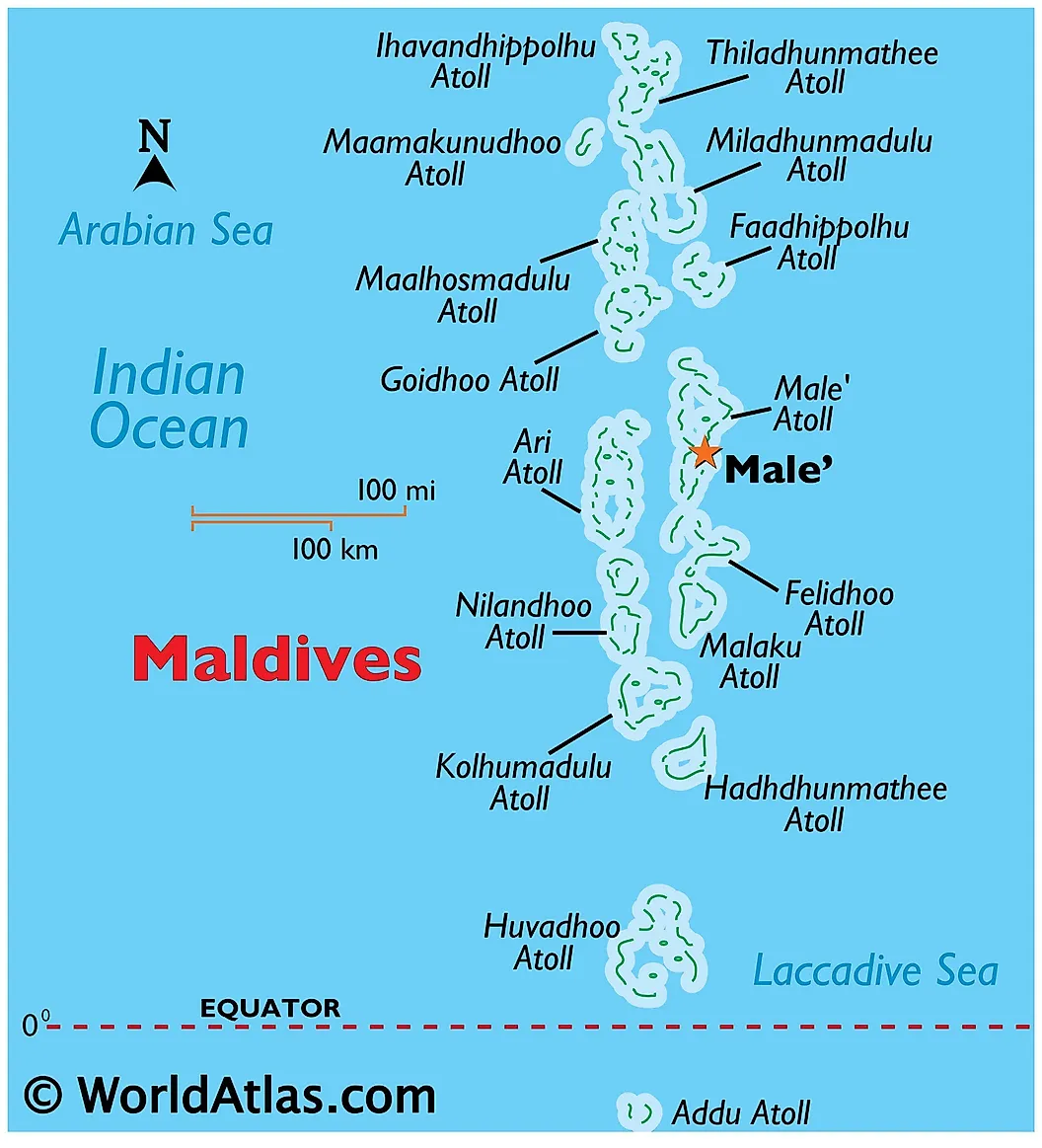
Population of Maldives .. 521,457 ( 2021 ) .. 100% Muslim
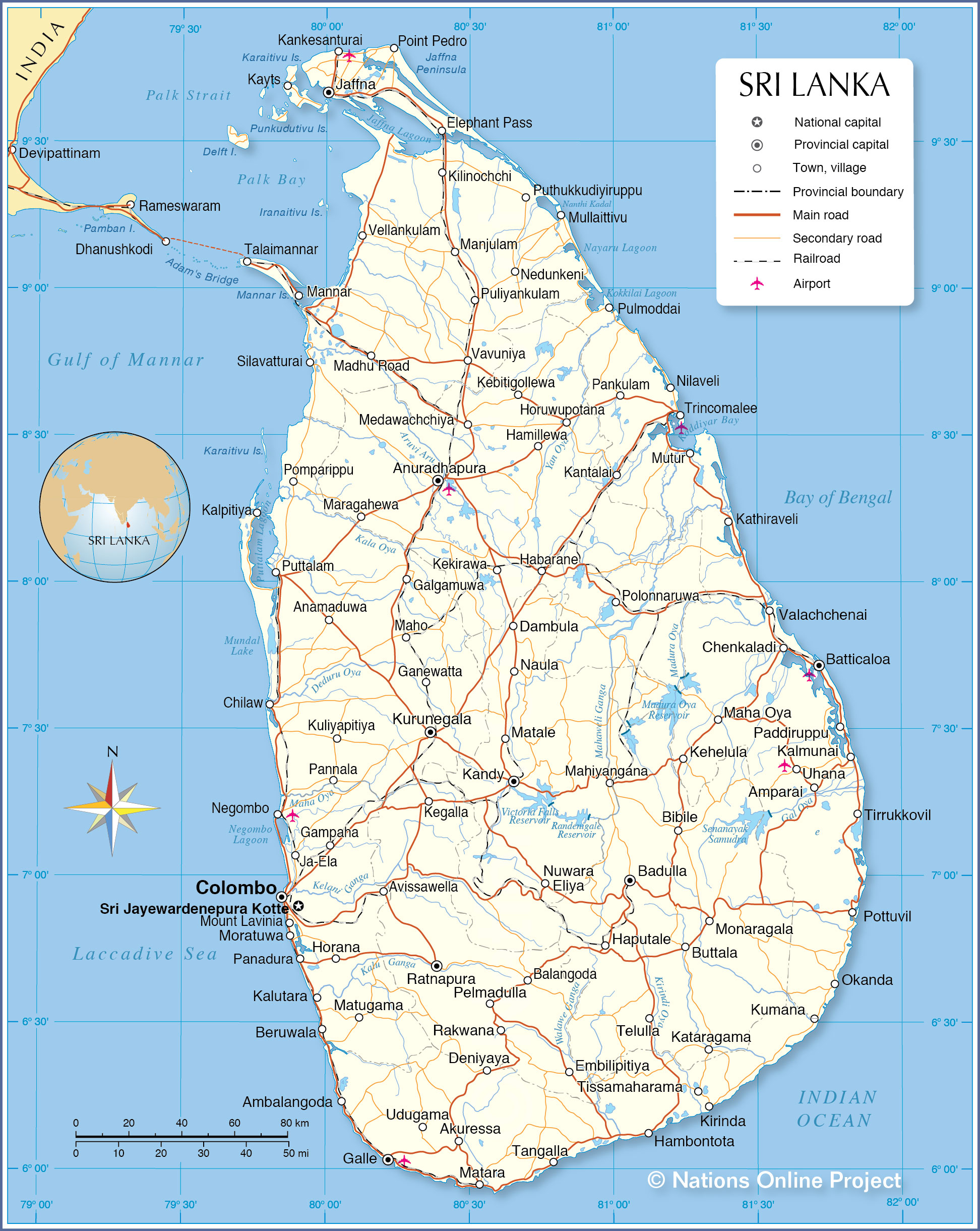
______________________________________________
1. XXX
Capital :
Population :
_____________________________________________
_____________________________________________
2. XXX
XXX
Airport picture
xxx
View of the city picture
Capital : xxx
The main mosque in xxx picture
xxx
_____________________________________________
___________________________________________
3. XXX
_____________________________________________
____________________________________________
4. XXX
_____________________________________________
___________________________________________
5. XXX
_____________________________________________
___________________________________________
6. XXX
_____________________________________________
__________________________________________
7. XXX
_____________________________________________
_________________________________________
8. XXX
_____________________________________________
_________________________________________
9. XXX
_____________________________________________
_________________________________________
10. XXX
_________________________________________
_________________________________________
xxx
_________________________________________
back to top
_________________________________________
xxx
_________________________________________
back to top
_________________________________________
For Taiwan, Indonesia is the largest source of foreign migrant workers. In 2012, there are around 185,000 Indonesian migrant workers in Taiwan, ranked as the largest among Southeast Asian migrant workers there, which equal to 42 percent of total foreign workforce in Taiwan. Their number is continually increasing, as in January 2011, the Agreements on the Placement of Indonesian Manpower in Taiwan was signed.[1] In 2014, the figure raised to 190,000 Indonesian laborers out of total 450,000 foreign workers in Taiwan. Indonesian President Joko Widodo has praised Taiwan for its friendly treatment of Indonesian workers.
In Taiwan, employers can be fined if they force Muslim workers to come into contact with pork, something forbidden by the Muslim religion that most Indonesians profess. In Chiayi City, a couple was fined for doing that to an Indonesian worker, in addition to other offences such as an imposing a long workday, and threats of deportation.[3]
In 2013, an Indonesian worker, who is married to a local Taiwanese man, built a mosque called the At-Taqwa Mosque in Dayuan Township, Taoyuan County(now Dayuan District, Taoyuan City) to support the growing number of Muslims, especially from the Indonesian workers community.
At-Taqwa Mosque in Dayuan District, Taoyuan City.

An-Nur Tongkang Mosque in Donggang Township, Pingtung County. ... also built by Indonesian workers
_________________________________________
back to top
_________________________________________










